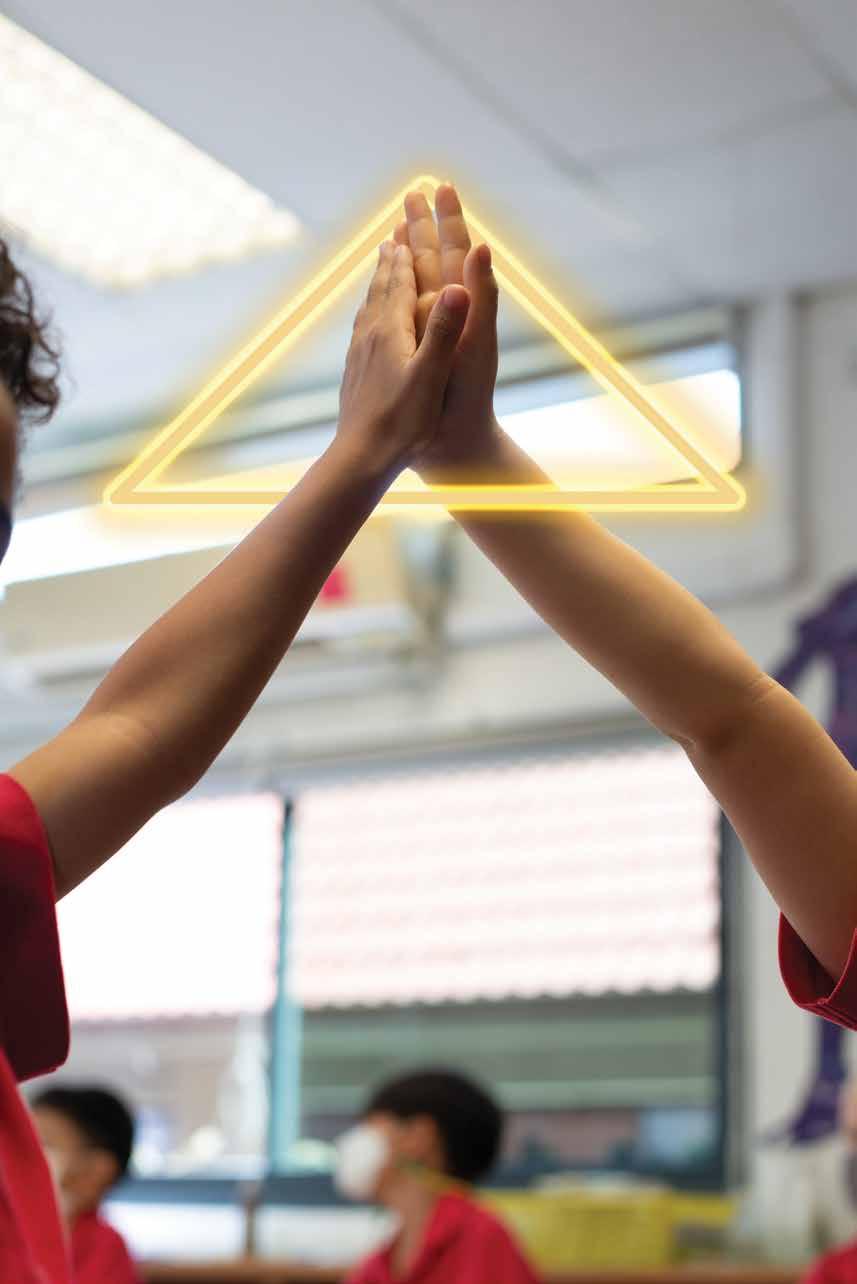BUSINESS:
Sandvik opens factory in Malaysia
INTERNATIONAL:
Finland is now member of NATO
COMMUNITY:
Dane supports home for Thai children
School Theme: How to pick an international school?

2023
APRIL
PERSONALISED PATHWAY TO THE WORLD’S TOP UNIVERSITIES
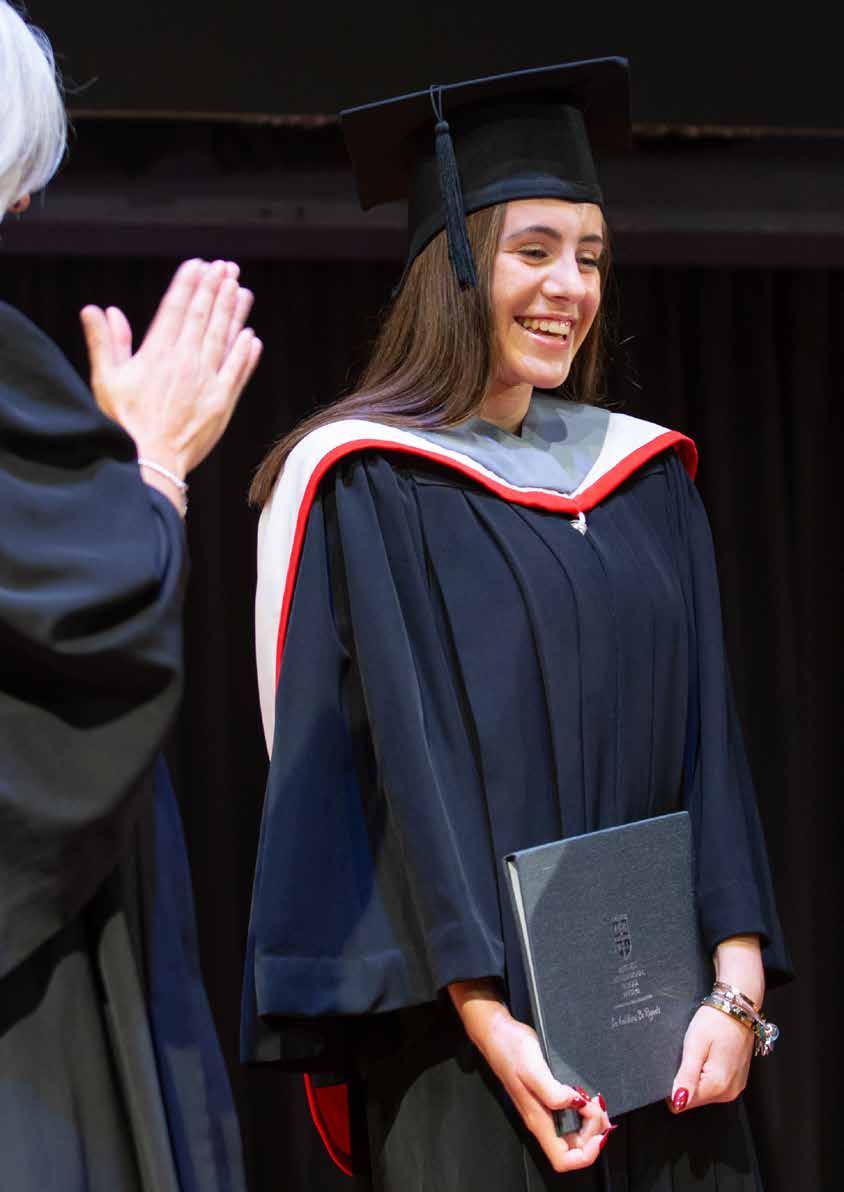
The only school in the area to offer both the International Baccalaureate Diploma Programme AND the A Level system to 16-18 year olds
Discover Sixth Form at Regents International School Pattaya
regents-pattaya.co.th


ScandAsia stories
8 Nordic countries plan joint air defense

10 China opening for inand outbound tourism


13 Au Pairs from Philippines blocked by Norway

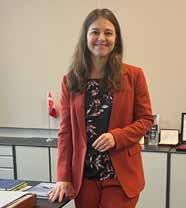




14 Finland now member of NATO

4 ScandAsia • April 2023
13 10 14
Pros
40
8
Focus on International Schools How to pick an international school
and cons of wearing uniforms
42 22
2023 16 44 48
How is A-level different from IB DP?
April
Danish Ambassador Landi in Singapore Finding time to focus on Singapore’s green transition
Dane supports abandoned children in Khon Kaen at “Baan Luuk Rak”
Tham Luang Cave five years after the spectacular rescue of the wild board football team
Expand your horizon.
Whether you’re taking your first step in Asia, or you’re already well on your journey, we can help with your Private Wealth Management needs.
Being the leading Nordic bank in Singapore, we understand the unique challenges you face living and investing in Asia. With a wide network and decades of experience, we can help you achieve your goals.

+65 6357 0882 | sebgroup.lu/singapore
Skandinaviska Enskilda Banken AB (publ), Singapore Branch
50 Collyer Quay #12-03 OUE Bayfront, Singapore 049321
Singapore Registration Number: S88FC3906E
Artificial Intelligence is dangerous
Using the word “dangerous” about AI - artificial intelligence - is like like saying nuclear bombs are “dangerous”.
We have no idea of how dramatically AI will change our lives and have even less of an idea of the impact of the next level called artificial general intelligenceAGI. The developers intentions may be all good, but who can guarantee us that AI can not be used to plan and execute hacking and distortion of statistics and other crimes, spread false information, or manipulate the very emotions that make us human? The list can on and on.
AI experts talk about “alignment” — that is, making sure AI systems are in line with human values and goals. But it’s impossible to eliminate all potential misuses. As a system like this learns from data, it develops skills that its creators never expected. It is hard to know how things might go wrong after millions of people start using it.
Recently, Elon Musk and more than other 1,000 technology leaders and researchers urged artificial intelligence labs to pause for just six months the development of the most advanced systems.They warned in their open letter that AI developers are part of an “out-of-control race to develop and deploy ever more powerful digital minds that no one — not even their creators — can understand, predict or reliably control.”
Some experts are mostly concerned about nearterm dangers, including the spread of disinformation and the risk that people would rely on these systems for inaccurate or harmful medical and emotional advice.
But other critics are part of a vast and influential online community called rationalists or effective altruists, who believe that A.I could eventually destroy humanity.
Ultimately, keeping a lid on dangerous AI technology will require that all nations agree on a global regulatory system and experts are not optimistic this can be agreed upon by existing government institutions.
Non AI controlled humans may ultimately be forced to form completely offline, analog, anarchistic communities and through sabotage and other violent means cut the AI controlled humanity off from the energy resources it needs for it to not collapse.
ScandAsia is a printed magazine and online media covering the people and businesses of Denmark, Sweden, Norway, Finland living and working in China, Hong Kong, Thailand, Malaysia, Singapore, Indonesia, Philippines, Vietnam, Cambodia, Laos and Myanmar.
Who should subscribe:
ScandAsia subscribers are typically Nordic expats and companies from the Nordic countries living in and active in Asia. Another group of subscribers are Nordic people living in the Nordic countries who subscribe to ScandAsia for personal or business reasons. We also have many Asian subscribers, who for a wide range of reasons are following the activities of the Nordic expats and companies via a subscription to ScandAsia.
The ScandAsia magazine is produced every month and distributed to all print version subscribers via postal services and to all eMagazine subscribers via email. Subscribing to the eMagazine is FREE - simply sign up on the ScandAsia.com website.
Become a ScandAsia user/ get free digital ScandAsia magazine or paid subscription via www.scandasia.com!
Publisher : Scandinavian Publishing Co., Ltd. 211 Soi Prasert Manukitch 29 Prasert Manukitch Road Bangkok 10230, Thailand Tel. +66 2 943 7166-8

Fax: +66 2 943 7169
E-mail: news@scandasia.com
Editor-in-Chief : Gregers A.W. Møller gregers@scandmedia.com

Advertising : Finn Balslev finn@scandmedia.com
MB: +66 81 866 2577

Graphic Designer : Peerapol Meesuwan Peerapol@scandmedia.com
Production Manager: Sopida Yatprom
Printing : Inthanon Interprint Company Limited.
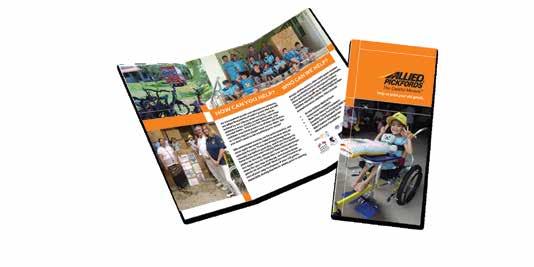
6 ScandAsia • April 2023
6 ScandAsia • April 2023 Editorial
Gregers Moller Editor in Chief



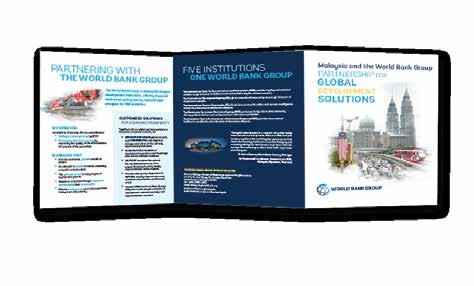


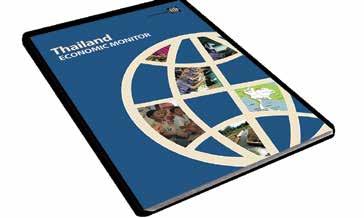




April 2023 • ScandAsia 7
High-speed ferry sailing from Philippines to Denmark
The 115-meter high-speed ferry, Express 5, and its crew is now sailing from Cebu, the Philippines to Rønne, Denmark, reported the Manila Bulletin.
Philippine Ambassador to Denmark Leo Herrera-Lim said “[Express 5] signifies the country’s growing expertise and capability in constructing world-class vessels at competitive rates.”
The ferry was made by Austal Philippines to redefine travel between Ystad in Sweden and Rønne, according to the Department of Foreign Affairs (DFA).

It can accommodate up to 1,610 passengers and around 450 cars at a time and has a full bistro and bar, a children’s play area, and multiple audio-visual screens.
Nordic countries plan joint air defense
Air force commanders from Sweden, Norway, Finland and Denmark said on Friday, March 24, that they have signed a letter of intent to create a unified Nordic air defense.
The intention is to be able to operate jointly based on already known ways of operating under NATO. The move to integrate the air forces is triggered by Russia’s invasion of Ukraine last year.
“Our combined fleet can be compared to a large European country,” said commander of the Danish air force.
A joint Nordic air force will be consisting of over 250 front-line combat aircraft. It is unclear how many of the planes are operational.
Sweden and Finland also applied to join NATO last year, but the process has been held up by Turkey, which along with Hungary has yet to sanction the memberships.
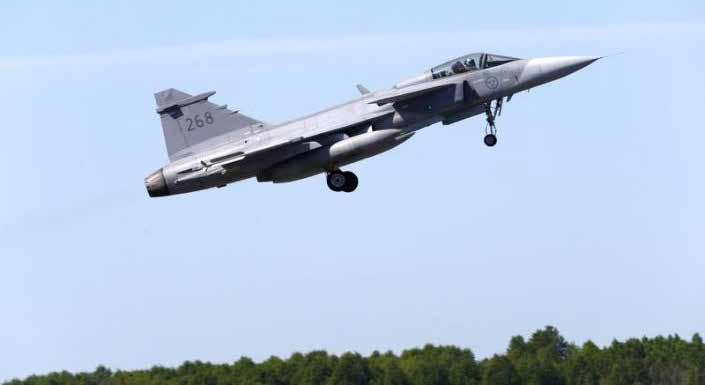
8 ScandAsia • April 2023 News brief
Swedish Sandvik to establish new production unit in Malaysia
The Swedish company Sandvik is establishing a new production unit in Malaysia for manufacturing underground loaders and trucks.
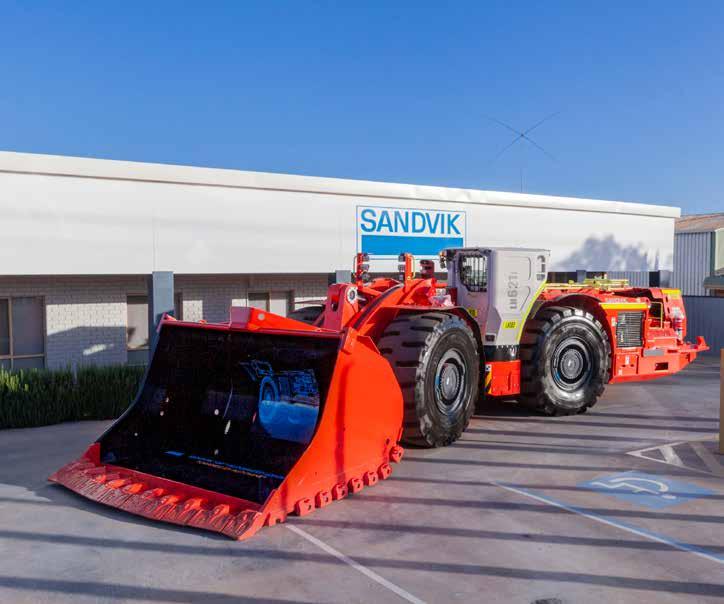
According to Sandvik, the establishment of the new unit is an effort to respond to growing demand for the company’s battery-driven electric vehicles (BEVs). Equipment production is planned to begin in the December quarter of 2023.
While the new production units primary focus will be BEVs, it will also manufacture conventional
loaders and trucks as well as battery cages.
Annual manufacturing capacity is planned to increase gradually to 300 loaders and trucks and 500 battery cages by 2030.
The new facility in Sendayan TechValley business park, resides 15 km west of the state capital Seremban. The factory is 90 km southeast of Port Klang, Malaysia’s largest seaport and one of the busiest container terminals in the world.
“Malaysia is among the most technologically developed countries
in Southeast Asia and has abundant skilled labour, strong local industrial suppliers and reliable infrastructure,” Mats Eriksson, President of Sandvik Mining and Rock Solution, said.vv
April 2023 • ScandAsia 9 News brief
China is fully reopening for inbound tourism

China is fully opening for tourism in the hope of boosting the economy.
Almost three years after China closed its borders to foreign visitors in an attempt to manage Covid-19, China is fully reopening.
On March 15, 2023, China began issuing visas in all categories for foreigners. This move comes after China declared victory over the virus in February 2023.
Travelers to China still have to follow Covid-19 protocols. The protocols include a required coronavirus test 48 hours before departure. Additionally, visitors are required to fill in their test results in their health declaration forms for customs.
Maersk launches air freight service to China
A.P. Moller – Maersk announced Monday, March 20, that the company is launching a new air cargo service between Billund, Denmark and Hangzhou, China. The new service is a respond to increasing customer demand.
The scheduled operation began on March 20 with three weekly flights. Here, the company introduced the first of three newly renovated Boeing freighters that have recently been purchased for Maersk Air Cargo.
All Europe-China flights will be operated by Maersk´s internal cargo airline.

“With the introduction of our new service between Europe and China, we have taken another leap with our customers in providing true integrated logistics. We want to ensure that our customers have the visibility, reliability, and resilience
in their supply chains,” says Michel Pozas Lucic, Global Head of Air in A.P. Moller – Maersk.
The first flight also marks the first scheduled air cargo operation between Denmark and Asia.
The corridor from Billund Airport is expected to significantly increase access for high value and time sensitive cargo between Scandinavia, Northern Europe, and the entire Asia-Pacific.
10 ScandAsia • April 2023 News brief
China resumes outbound tours to 40 more countries – including Denmark

China will resume outbound group tours to another 40 countries and regions from March 15. According to the Ministry of Culture and Tourism, some of the 40 countries and regions includes Nepal, Spain and Denmark.
Travel agencies and travel portals are allowed to sell and promote group tour products to these 40 destinations from Friday.

According to the culture and tourism ministry, travel agencies are required to remind travelers of their personal health before departing for group tours and to make sure they protect themselves overseas.
Feb 6, the nation resumed group tours to 20 countries and regions including Thailand, Russia and Singapore after COVID-19 restrictions in the country were relaxed.
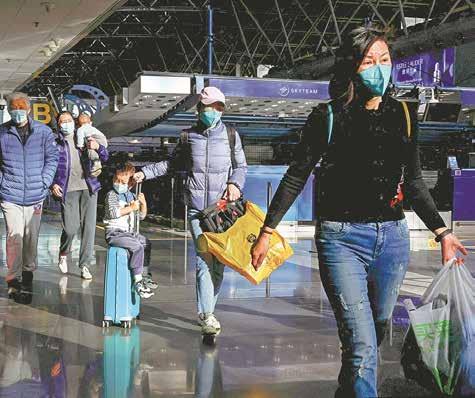
April 2023 • ScandAsia 11 News brief
Airbnb suspends Myanmar bookings
Airbnb has suspended hosting of all lodgings in Myanmar. The San Franciscobased company is the first international accommodation booking site to suspend bookings in Myanmar since the military coup, February 1, 2021.
Airbnb sent out an email notice to hosts in Myanmar last week, to inform that their listings and res-
ervations are no longer available. The email told hosts that their listing would no longer show up on Airbnb.
All hosts will still have listing details of past reservations and payment transaction history.
“Airbnb has suspended hosting in Myanmar. Guests will not be able to make reservations for stays in Myanmar until further notice,” said Airbnb when asked for a comment.
Schools in Laos close due to unsafe PM2.5 levels
All kindergarten classes in Bokeo and Xayaboury provinces of Laos were ordered to temporarily close due to the high levels of PM2.5.
As it is unsafe for humans’ health, Bokeo’s Education and Sports Department advised kindergartens to close from 28-31 March while Primary and secondary schools and universities will remain open, reported the Vientiane Times.
Authorities in Xayaboury province have also ordered the temporary closure of kindergartens and Grades 1 to 4 of primary schools in districts where PM2.5 readings ex-
Airbnb is not a significant player in Myanmar’s hospitality booking scene. This is due to strict laws that prohibit foreigners from staying in accommodations that are not registered with the authorities as hotels. Other booking services such as Agoda, Expedia and Booking.com continue to feature Myanmar hotels.

ceed the safety level defined by the World Health Organization.
Currently, several countries in Southeast Asia are suffering from the polluted air including Thailand, Myanmar, Vietnam, and Laos.
These countries have dealt with the dust caused from wildfires and people burning lands for agriculture.
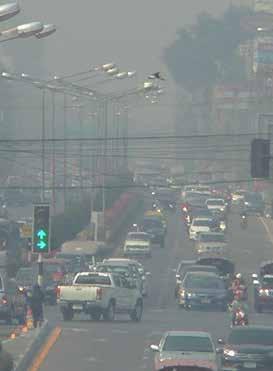
12 ScandAsia • April 2023 News brief
Being an au pair in Norway is over
Norway ends the country’s au pair program.
“The system does not work as intended. It is no longer about cultural exchange as it once was,” Minister of Labor and Inclusion Marte Mjøs Persen says.
The minister says that there must be decent working conditions for everyone, even when the work is done at home.
“Although many au pairs are fine with the families they live with, the program has also become a loophole for some to get cheap labour,” she says.

The au pairs disagree. Last year, 467 current and former au pairs wrote in an article in Aftenposten,
that the program was one of the few opportunities for them to experience life in a European country.
According to VG, there are 1100 people working as au pairs in Norway at the moment. Most of them are from the Philippines.
The program was set to give young people between the ages of 17 and 30 the opportunity to go on cultural exchange in other countries. They are covered for board and lodging and receive at least NOK 5,900 in pocket money per month. Instead, they must work a maximum of 30 hours per week.
The current leader of LO, called the program “Western slavery” already six years ago.
“Ending the au pair program is a great victory for the efforts towards a decent work life,” Persen says.
The au pairs still disagree...
April 2023 • ScandAsia 13 News brief
Finland now member of NATO
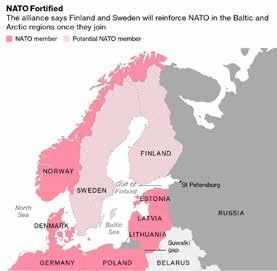
Finland’s President Sauli Niinisto, signed the NATO legislation, in a ceremony on March 23, tak-

ing the final step for his country to become a part of the North Atlantic Treaty Organisation (NATO).
Finland applied to join the alliance last year, in response to Russia’s war in Ukraine. The legislation incorporating NATO’s founding treaties was passed in parliament in Helsinki on March 1.
Hungary was holding out on its endorsement of the expansion but eventually on Monday 27, the Hungarian parliament approved Finland as a new NATO member. Turkey, the NATO member with most reservations, finally voted in parliament on Thursday 30 March to allow Finland to join.
All eyes are now on Sweden to see if Sweden will also be accepted.
Swedish man running sex network in Thailand sentenced to prison in Sweden
From his parents’ home in Stockholm, a Swedish man controlled a network that deceived approximately 4,000 underage girls in Thailand to send nude photos and videos of themselves. Material that was later resold to thousands on social media (link).

The Swedish man has now been sentenced to four years and six months in prison for his crimes. He is being sentenced for aggravated child pornography, aggravated money laundering, aggravated unlawful invasion of privacy and unlawful portrayal of violence. He must also pay nearly one million Swedish kroner in damages to six plaintiffs.
The man was arrested in Janu-
ary 2022 after cooperation between Swedish and Thai authorities. Thai police had discovered a network selling child pornography in closed groups on the social media platform VK. The business was traced to a property in Stockholm where the man was arrested.
Most of the 4,000 victims were between 13 and 17 years old when they were exposed. They have later told the authorities, that they were contacted by men who offered them money to photograph or film themselves naked. The girls were never paid, and the material was instead resold without their approval or knowledge.
The material consists of nearly
75,000 images and 20,000 films. 80 images and 400 films are judged to be particularly reckless.
The preliminary investigation showed that the closed groups on VK had between 20,000 and 30,000 paying members. The now-convicted man is set to have collected over two million Swedish kroner.
14 ScandAsia • April 2023 News brief
Maersk will switch to ships running on green methanol
Vincent Clerc, CEO of Danish shipping company Maersk, said the company will no longer order any ships running on traditional carbon-based fuels. Instead, they will switch to green methanol.
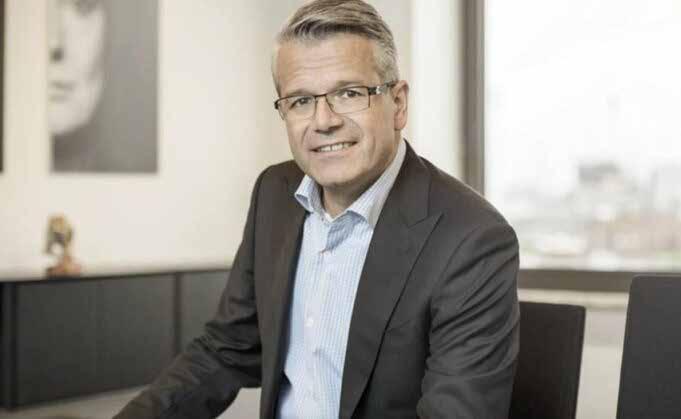
“As China reopens, there will be lots of opportunities to capture. The portfolio of Chinese customers continues to expand,” Clerc said in an exclusive interview with CGTN. This statement may be due to the fact, that the green and lowcarbon transition is one of the hot topics at the China Development Forum (CDF) 2023.
Upstream assets available for sale across Southeast Asia
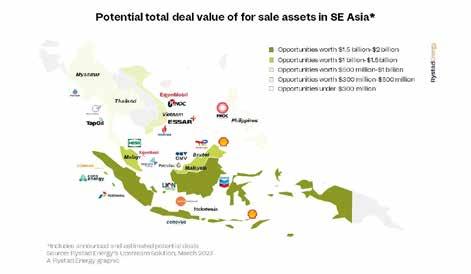
According to Rystad, among the potential assets available, 74% are in the pre-final investment decision stage, while 21% are already in production and the remaining 5% are under development.
“The sheer magnitude of the oil and gas deals in the region will reignite the sector.This will reduce reliance on national oil companies and major players that has developed in recent decades,” said Prateek Pandey, vice president of upstream research in Rystad.
More than $5 billion of upstream assets are available for sale across Southeast Asia, according to Norwegian Rystad Energy.
Most of the opportunities are in Indonesia, where more than $2 billion of assets are on the market.
This is followed by Malaysia and Vietnam with about $1.4 billion and $1 billion of upstream assets for sale. Deals totaling $700 million have already been completed in the region this year. This is the strongest start to upstream activity in Southeast Asia since 2019.
Administrative reforms implemented in Malaysia, Indonesia and Thailand are said to have boosted interest from energy majors in these countries. Vietnam and Cambodia are now seeking to enact similar processes to stimulate investments and transactions.
April 2023 • ScandAsia 15 News brief
Ambassador Landi’s burnt red suit, that she bought on sale back in Denmark, brightens up the otherwise grey office space in 101 Thompson Road. Besides her own presence, the only colorful thing around is the two Danish flags placed on the dresser behind her desk and two framed pictures that indicates, that there is a private person behind this passionate and dedicated working woman.
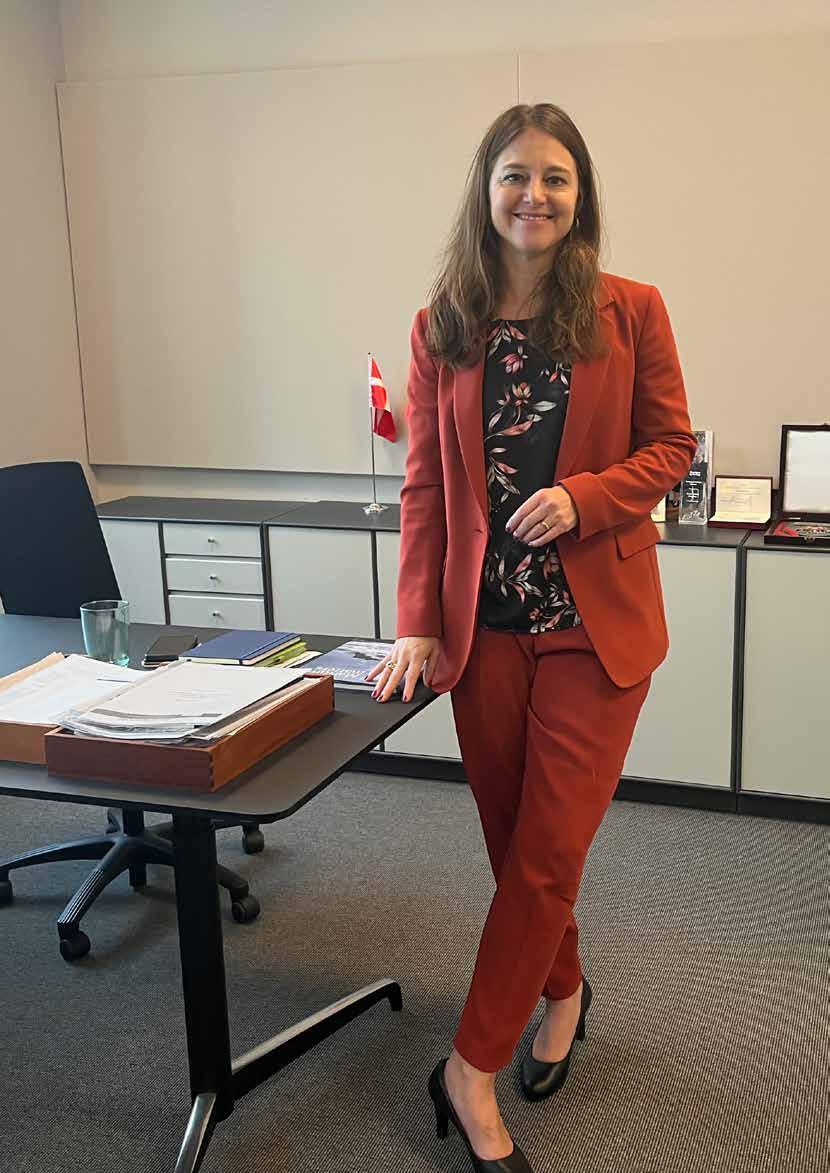
I was very happy to come back to Southeast Asia. I think it is an incredibly exciting region to work in.
16 ScandAsia • April 2023
Photo: Mallikka Smedegaard.
Ambassador Landi focused on a green transition in Singapore
Denmark’s Ambassador to Singapore, Sandra Landi Jensen had a challenging start but is now working hard in the pursuit of a green transition in Singapore.
Text and Photos by Miabell Mallikka Smedegaard
Sandra Landi took over the post as the Danish ambassador to Singapore in august 2020. This was during a time where the pandemic was at its highest. Though it was an important time to step in to the role, it also proved challenging for the newly appointed ambassador.
”Taking over this position during the Pandemic was a challenge. We spent a lot of time trying to observe and report back to Denmark on what Singapore was doing in relations to the pandemic,” the ambassador laughs.
Singapore’s covid restrictions were among the strictest worldwide, which made it difficult for the ambassador to fulfill her duties. For most of the first two years of her deployment, there were harsh restrictions on how many people were allowed to meet. For 8-9 month people were only allowed to gather two people at any given time. This made it hard to create a network and to generate connections between Denmark and Singapore.
”Much of what we do is to bring people together. Our main job is to ensure that Danish companies or visiting delegations manage to meet with the right people. This is very difficult if you can only arrange a meeting between two people,” she adds with a warm laugh.
Several challenges

Another challenge at the embassy, was helping all the Danes who got caught in the various Corona restrictions. “Traveling in and out of the country was not permitted. Or you could leave the country, but it was sometimes difficult to travel back in. So overall we spent a lot of time and energy on the pandemic.”
Her burnt red suit, that she bought on sale back in Denmark, brightens up the otherwise grey office space in 101 Thompson Road. Besides her own presence, the only colorful thing around is the two Danish flags placed on the dresser behind her desk and two framed pictures that indicates, that there is a private person behind this passionate and dedicated working woman.
Getting back to a new normal
”Singapore doesn’t make rules for fun. In the everyday life here you don’t really notice them. But you noticed during Covid, where there were so many strict rules to obey.”
April 2023 • ScandAsia 17
When they removed most of the restrictions in the autumn, all the embassy tasks came pouring in at once. This resulted in some long and stressful months for the ambassador. Finally, she seems to have reached a point of normalcy. She is now beginning to get the sense of what the everyday life as the Danish ambassador to Singapore in reality looks like.
”It’s really nice. It is much more fun and more giving to work on digitalization or the energy challenges than it is to talk about Covid restrictions and infection rates,” she adds with beaming eyes and a positive smile.
Not her first time in Southeast Asia
It is not the ambassadors first experience with southeast Asia. She was stationed in Bangkok from the end of 2013 to 2016. After that she worked in Washington for a few years, primarily at the World Bank. After that, she was back in Denmark for a year before she took on the position as Denmark’s ambassador to Singapore.
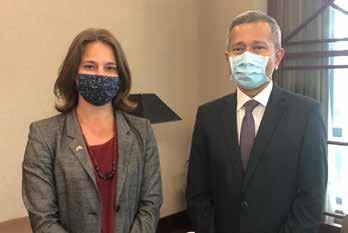

”I was very happy to come back to Southeast Asia. I think it is an incredibly exciting region to work in. The countries are very different from each other. It is not a homogeneous region. But all countries seem to be keen on cooperating within the areas they are capable of cooperating on,” the ambassador says with a lot of enthusiasm.
One of the reasons why the ambassador finds the region extremely interesting, is its diversity. The region is
well known for its function as a form of production house. But the ambassador has witnessed a change in the attitude towards the production industry. An area that has become more focused on becoming greener.
“The whole green energy agenda has become relatively big in the region. This is very well, since that’s one of Denmark’s main agendas,” she adds.
Going green is not an easy transition
Unlike the Nordic countries, Singapore faces the problem of not having any wind. The country has therefore set up solar cells everywhere possible. Still, it is simply not enough to cover the country’s energy needs. Singapore is thereby challenged by the fact, that the country doesn’t have access to renewable energy. This is something the Scandinavian embassies spend a lot of time working on.
”It is something that we work on in cooperation with all of ASEAN. Both on a national level, regional level and on a broader scale.”
She then adds, that the collaboration between the environmental ministries has been proven fruitful. Among others, the ministries work together in support of Singapore’s Green Plan 2030.
”All parties agree that something must be done and Singapore is a very action-oriented country. This makes the collaboration even more interesting,” ambassador Landi adds.
18 ScandAsia • April 2023
Singapore is known as “the little red dot”, but the goal is to be called “the little green dot” instead.
Collaboration between the Nordics
According to the ambassador, there is a close cooperation between the Nordic countries, which all share the same green agenda.
”Together, we try to promote a green transition and sustainability. We all act together under this umbrella we call sustainability. Everything we work on is in some way related to creating sustainable solutions,” she says.
At the moment, the Nordic embassies have a joint project on circular economy. Here, each nation bring in talents from their respective country in cooperation with Singapore.
“Singapore is very inspired by how we run things in the Nordic countries. Singapore is a far more liberal country.Their tax level is much lower than ours, so it’s not because they wish to copy our welfare system, but there are still many areas in which they are very interested.”
According to the ambassador, the interest for the Scandinavian nations has also something to do with the fact, that they are all small countries.
“It’s like there is a mutual understanding between us because of that,” the ambassador adds.

Better late than never
According to Landi, Singapore has joined the climate battle a little later than many other countries. But despite the late start, the country is very set on reaching their goals for 2050.
”Right now, the country is known as “the little red dot”, but the goal is to be called “the little green dot” instead,” she tells with excitement.
One of the ambassador’s main focus areas has become energy efficiency of the buildings in Singapore. According to Landi, Denmark has many skilled companies within that field. This is despite the fact, that the Danish companies are mostly used to keeping the heat inside the buildings. But according to the ambassador, many of the same technologies can also be used in keeping the heat out and the cool air in. One of her core tasks is therefore to promote Danish solutions in energy efficiency. This would not only help reduce Singapore’s climate footprint, but also help create jobs back in Denmark.
Not just a one-way street
The cooperation between Denmark and Singapore is according to the ambassador, not just a one-way transaction.
”This is what makes the cooperation so interesting, that it is two-way. Of course, it is very important to us to sell Danish solutions, but we can also bring a lot back to Denmark.”
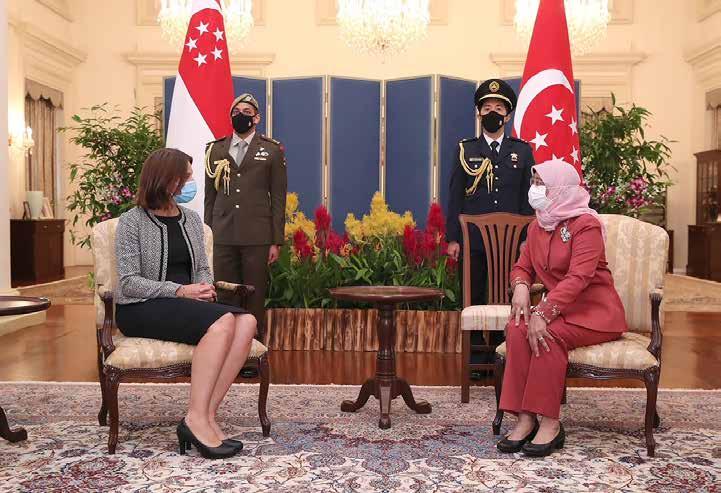
April 2023 • ScandAsia 19
One of the systems that the Danish embassy is getting inspired by, is how Singapore manages the huge amount of rain they have without experiencing flooding. A system the ambassador thinks might be interesting to her home country.
She then explains how they are working on collaborating in several areas. The goal is for the two countries to extend the cooperate to involve research, further exports and attract investments from Singapore.
“In the past, Denmark looked more at Singapore as a market. It is still a market, but it has also evolved to be much more than that. That makes it so interesting to be a part of this bilateral cooperation.”
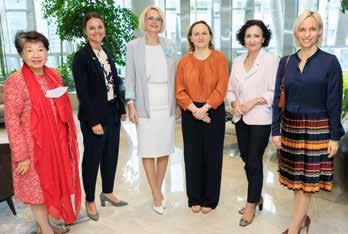
Much easier to collaborate
Back when ambassador Landi was stationed in Thailand, she experienced the military coup back in 2014. It made it difficult as a European diplomat to try and cooperate with a military government. A collaboration that proved to be complex and resulted in many projects being put on hold.
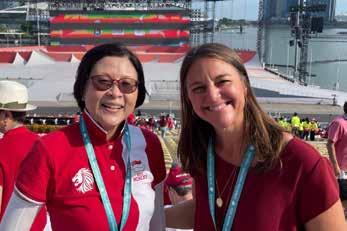
“The cooperation here in Singapore is much easier. We see more eye-to-eye on things,” she then adds.
According to the ambassador, this is one of the reasons why she believes Singapore to be a relatively easy country to be a Danish ambassador. She adds, that the cultural gap is not too deep.
“We are very direct in Denmark, and they are
relatively direct in Singapore as well. Although they are not quite as direct as we are in Denmark. But as a Dane, you will probably always have to moderate yourself a bit when going out in the world,” she says with a warm smile and an affectional laugh.
Not eye-to-eye on everything
”There is no doubt that one of the areas where we disagree with Singapore, is our views on freedom of speech. That is no secret. It is something that we talk openly about and we agree that we have different views on this. Singapore was built on painful experiences of ethnic clashes when they were part of Malaysia. This is why there is a fear of racist statements. That is Singapore’s reason for restricting freedom of expression in the country.”
At the same time, she makes it clear, that Singapore is not a restrictive regime on all levels. This is why the ambassador does not believe it to be a problem that affects their relationship.
“But it is something we talk about once in a while. Just like we raise questions on their use of the death penalty and caning (a physical punishment in the form of being whipped with a bamboo cane). It is certainly issues we often raise, not just from the Danish side, but from the EU as well,” the ambassador shares.
Despite the many areas where the two small nations seem to have a shared understanding, there
20 ScandAsia • April 2023
Another reason why it is such an easy place to settle down. There are many good schools in Singapore and they are easy to access.
are still difference in how they each go about creating the ideal society and how they define democracy. Still, she doesn’t see it as a big barrier in their cooperation.They agree to disagree on certain areas and manages to have an open dialog about their differences.
Will miss it
With only a year and a half left as Denmark’s ambassador to Singapore, Sandra Landi can already say, that she is going to miss the country when she is set to leave.
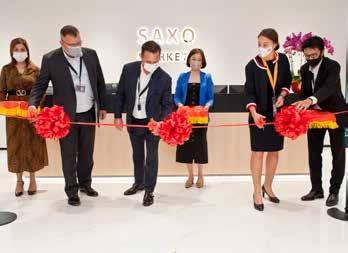
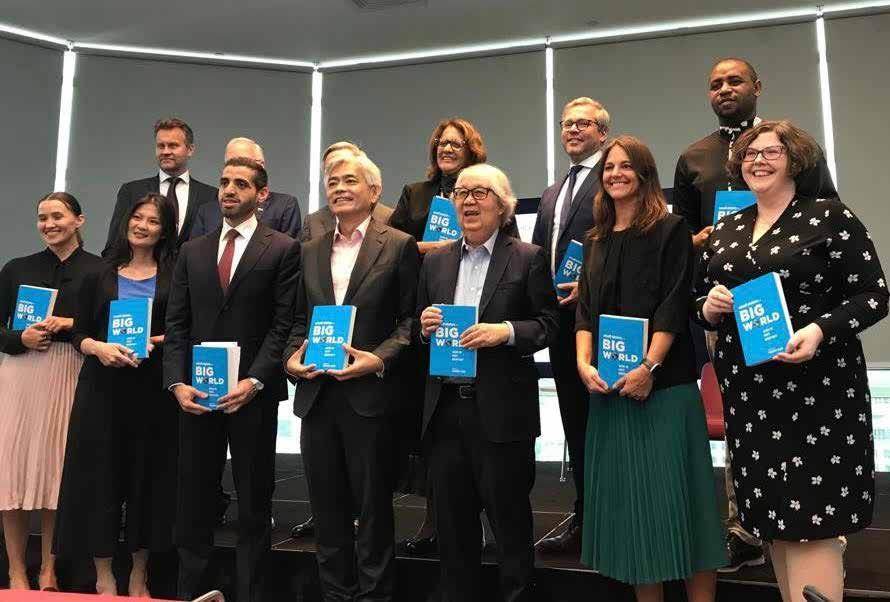
“I will miss Singapore when I leave here in a year and a half. I still miss Thailand from my time there. To me, every country has some strengths and good sides that
you will miss, when your time there is over,” she says with a bit of nostalgia.
Still, she makes it clear, that she is not focused on the future. Instead she tries to stay present and focused on the tasks ahead of her.
“You have to stay present when you live this changeable life as a diplomat,” she adds.
A skill she has also adopted for the sake of her two girls at the age of 9 and 11, who attends an international school in Singapore.
“It is equally important to them, that we focus on our everyday life here and have them feel a sense of security instead of focusing on what is going to happen next.”
Both girls are being taught Danish as a part of the curriculum in school, which is not an option in most places.
“Another reason why it is such an easy place to settle down. There are many good schools in Singapore and they are easy to access. Singapore is in general a lovely place to live. It’s a nice place to be. There is a lot of work to be done, but there is a positive agenda here, which makes it much easier to get things done.”
April 2023 • ScandAsia 21
How to pick an international school?

Annual tuition fees are not a sure indicator that the more expensive the school is the better education and experience your child will have. Smaller schools with fewer facilities can sometimes be less costly but they can still be an excellent choice.
Choosing a new school, pre-school, or kindergarten when moving to a new country has become increasingly difficult for parents. Each institution has its own unique philosophy and attributes and in some Asian cities, the choices are endless. Comparing what each place offers with the needs of your child is no simple task.
A good place to start is to check available options in your area and ask other parents of your own nationality or other expats which school they have chosen for their children and why. This may give you some indication of which schools are popular in your area and more importantly why before you make your own inquiry into each available option.
You can find a list of many associations and institutions for your nationality in your country of residence here.
22 ScandAsia • April 2023
Local vs International
The first thing you will have to decide on is whether you are looking for a local school or an international institution. In most countries in Asia, a local school is an option - although certainly a more challenging option for your child especially if they do not speak the local language. If your child is mixed Scandinavian - Asian this may, however, not be so frightening a prospect but it can still be a very different experience than your child has been used to in the past.
Local schools offer a very local environment and teach after traditional local methods that are easier for younger children to adjust to because they have no previous school experience, but for older children, the cultural differences can be quite a shock and an important aspect to consider beforehand. Local schools, however, have an economic silver lining and are less costly compared to international schools.
Physical punishment has not been abolished in many Asian school systems, however, so talk to the school about how they administer physical punishment and ask if they can make an exception for your child if you are not comfortable with this.
If you go for an International school your child will be provided a curriculum that is not the national curriculum of the country it is located in. The most common national curricula used in international schools in Asia are the National Curriculum of England, or an American curriculum, or adapted versions of these.

An international school also provides an environ -

ment that is more familiar to that of Nordic schools and often overall has a more westernized set of guidelines and teachings. The environment of most international schools in Asia will still be vastly different from that of your own because it consists of children from around the world and your child will be exposed to a greater volume and variety of cultural influences than those who grow up in one particular cultural setting.
Both the benefits and challenges of either a local school or an international school are important and very relevant aspects of life abroad. Children studying abroad often develop a very different attitude to many issues compared to their former friends back home and even you yourself. On one hand, integration is essential and if your child is going to be raised in a culture that’s not your own, it’s your duty as a parent to facilitate that. On the other hand, as parents, it can be hard when parts of our own culture are lost as our children embrace a country that becomes home to them in a way it never can be to us.
Once this is said, most European families prefer the international option.
In Bangkok you will find Bangkok Patana School
Bangkok International Preparatory & Secondary School (Bangkok Prep)
ISB International School Bangkok
King’s College International School Bangkok
KIS International School
April 2023 • ScandAsia 23
The international school network Cognita currently has four St. Andrews schools in Bangkok: St. Andrews International Schools, Dusit St. Andrews International School, Green Valley St. Andrews International School, Sathorn St. Andrews International School, Sukhumvit 107
Just outside Pattaya, the best choice is: Regents International School Pattaya
After 7th or 9th grade, other options like one of the excellent boarding schools back home in Scandinavia or out here in Asia may be considered.
In Phuket, British International School, Phuket is an excellent combination of the two, having both boarders and days school students.
Elsewhere in the South East Asia region, the Tanglin Trust School in Singapore should be highlighted as an excellent international day school.
For most European children, classes in the mother tongue are available. For most nationalities, classes via the internet is also an option particularly if you are living outside the capital.

Important factors to consider when choosing the right school
So now you have the table filled with brochures of different schools and wonder what to look for. Keep in mind
your family needs, and trust yourself to balance these with your child’s needs and with your search for a good quality school. Here are a few suggestions to help you make up your mind:

First: How much does the school cost?
Before spending time looking through school courses, you need to make sure that you can afford to send your child to the school. Local schools tend to be very affordable but annual tuition fees among international schools in Asia can range from $1,800 to $24,000. International schools have between three to four terms per school year and normally fees are paid termly. Some International schools allow parents to pay tuition fees monthly but if this is a requirement from you, you need to check with the school first to see if that is allowed.
Annual tuition fees are not a sure indicator that the more expensive the school is the better education and experience your child will have. Smaller schools with fewer facilities can sometimes be less costly but they can still be an excellent choice with a more close-knit community within the school.
Second: How far away is the school from your home?
Another important factor that may eliminate a few options for you easily is how far away the school is located. Bear in mind that in most big cities, it is the traveling time
24 ScandAsia • April 2023
between your home and the school that matters and especially in larger cities, you will be challenged by some very heavy rush hour traffic. How long will it take for your child to get to school and home afterward? How will your child be going there? Coordination if you have several children under education, etc.
Third: What reputation does the school have?
Talk to as many people as possible.This is where your first intuition comes in handy and if many say the same it is probably true. Be sceptical of opinions from parents, who have kids at one schools - they are often quick to seek confirmation of their own choice by adopting negative opinions about the competing schools.
The age of the school is no sure indication either. Nothing guarantees that the reputation of a hundredyear-old school is better than a one-year-old school.
Fourth: What are the school’s fundamental principles?

Repeated, unbiased research shows that all truly outstanding schools adhere to certain principles. While all are important, the two most important factors are:
1.The school has high expectations for all students. It means all students are expected & helped to meet high minimum goals; goals are raised for individual students as soon as they are ready to learn beyond grade level.
Avoid schools that make excuses for kids who are behind academically. If your child struggles, they may make excuses rather than help your child, too. Also, avoid schools that pretend none of their students struggle. All schools have more than a few students who face learning challenges at some point. You need to know in advance how the school will respond.
2. The school monitors progress and adjusts teaching. It means the school assesses individual student progress often and changes teaching approaches to ensure that every child locks onto learning. This is especially important if your child is learning a new language as he or she may have mastered math in your native language, but having difficulties with mathematic terms in another language. Choose a school that will keep your child’s levels up but will adjust teaching approaches to make sure the right language skills are taught at the same time.
Avoid schools that say, “Our grade-level work is tough enough for all students” and schools where everyone makes grade level, but few kids score far above grade level. Both academically gifted children and motivated “typical” kids miss out in a school that is focusing on grade level only.
Fifth: How are the courses at the school and do they match my child’s needs?

All children need a school that will appropriately challenge and nurture them to succeed in core academic subjects, but research shows you can significantly improve your child’s life and school performance by choosing and working with the right school, so you have plenty of reasons to give it your best effort.
The school’s courses and programs will most likely be listed in the school’s information packages. They will talk about British Curriculum and American Curriculum and - what most Scandinavians these days go for - the IB curriculum.
This is important if you relocate in the future so choose what fits best with the school system back home. Both the British Curriculum and the American Curriculum, however, are recognized and accepted worldwide. Ask questions about the tests and exams which are offered and used as an evaluation method. Some international schools require a certain level of English language skills before accepting new students and it is, therefore, an important factor to look into if your child has little or no English language skills. Some international schools offer pre-language courses to help your child to an easier start and some international schools offer private tutoring to help your child excel faster once accepted into the school. If your child is already a secondary school student, ask how well the graduating students do in getting accepted into major universities both in your current country, back home, and elsewhere overseas.
April 2023 • ScandAsia 25
You can also find out if the native language and culture of your child is taught as optional learning as your child needs to keep his or her ties to your cultural background. It is also important for you. If such optional learning is not offered, most Asian cities have local Scandinavian communities where native Nordic languages often are taught as an after-school activity.
Sixth: What other activities can the school offer your child?
Besides the fundamental course works, what kind of arts, sports, community service does the school offer? Are there proper facilities to support those activities?
It seems that schools almost compete with each other when it comes to sports, thus many schools will have gymnasiums and sports complexes, which are either new or remodeled. But maybe your child is more into other activities - computer programming, performing arts?
Most schools offer after-school/weekend programs as well as field trips and community services. You should be able to freely pick the activities that best suit your child. Engaging in after-school activities is also an excellent way for your child to make new friends faster.
Seventh: Does the school have qualified personnel?
This is not as obvious as you may think. The school is most likely private and qualifications for employment are not always as strict as for schools back home. What edu-

cational degree do they hold? How long have they been teaching at the school? What kind of teaching methods do they prefer? Are they involved in planning and evaluating the curriculum? Will they be giving special attention to each child’s problems or personal needs? And more importantly, what do they do to make sure new students are welcomed and able to settle in the smoothest way possible.
Eight: What do the current students think of the school?
If it’s possible, talk to some of the existing students. Are they happy there? Do they look motivated to learn? How will the school help your child get started? Do they assign so-called “buddies” (another student from the same country) for new students? Most schools have established student organizations to provide service to students at a personal level. Here, students can get help with studying, working, individual needs, and so on.
Ninth: How is the relationship between the school and the parents?
You will obviously not be able to monitor your child in school. The teacher will have to be your eyes and ears. You must be notified of your child’s functionality regardless of grade, and regardless of whether it includes bad behavior or progress your child has made. Make sure that you can get informed as often as possible especially in the beginning to make sure your child settles in well at
26 ScandAsia • April 2023
school. You may also join a parents’ volunteer program if available. Some schools may offer activities for the whole family as well.
Your most important task after selecting a school - watch your child!
Moving to a new country, enrolling at a new school, and having a daily life in another language is an adjustment especially for children. It is therefore important that you make a habit of spending more time than you used to back home talking to your child about how school was today. What they did in class, and what they did outside. Let her or him tell you about their new friends. Listen. All may initially sound fine and uncomplicated, but that may just be a honeymoon period. Your child will be filled with new impressions and new ways of doing things and therefore, this is the most important step of them all. If your child develops in any way you find disturbing or even develops signs of discomfort with going to school, you should think twice before you tell your child that “this is life - it is not always pleasant!”. Allow them to adjust, support them in their transition and understand that this may be hard for them.They might feel frustrated that they can not communicate as freely at school as they are used to in their native language so have patience with them. Help them establish friendships outside school by inviting classmates home for playdates as this also helps your child speak the language much faster.
The process of starting in a new school abroad can also be hard for parents so speak to other parents who have gone through the same and listen to their advice. Things might not happen as fast as you would like them too but trust the process. Accept that the transition takes time and remember that after a few months, most kids suddenly excel at life abroad.
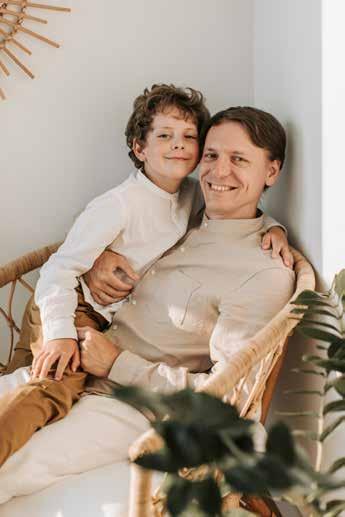
Final thoughts
The perfect recipe for choosing the ‘ideal’ school for your child does not exist. Many parents simply go by their own parental instincts. This is natural, and there is certainly nothing wrong with trusting your own instinct in the process. After all, you should feel comfortable and confident in leaving your child at the school gate in the mornings. Never mind how diligent you do your homework - and maybe the above list is a bit excessive - you will never be able to foresee if your child will thrive at the school.
However, the few professional tips and suggestions above should give you some ideas about what to look for when making up your mind. Keep in mind the important role you are taking in deciding the right choice for your child’s new school will contribute to your child’s progress toward a crucial foundation and an enjoyable schooling experience.

April 2023 • ScandAsia 27
Outdoor - why it is important now more than ever Learning

From early years to IB, Outdoor learning has an integral place in every student’s learning journey. Learning that takes place beyond the classroom provides unique and memorable learning experiences that enhances academic ability, well being and environmental stewardship. Here are just a few of the benefits of outdoor learning.
Creating memorable learning experiences
Research suggests that learning that takes place in a variety of environments helps to create novelty, which allows a space for students to draw on their learning experience at a later date. Learning outside of the classroom can create opportunities for deeper understanding of the topic through hands-on activities. Such activities create an engaging experience which allows children to actively embrace the skill at hand and remember those skills as part of the experiential learning activity. The result is that children are later able to recall the skills and knowledge that was learnt whilst simultaneously recalling the fun experience they had while learning it! This experiential learning has been a foundation of pedagogy since the times of Aristotle, and has been a golden thread in the foundations of education philosophy around the world.
Outdoor learning aids the transfer of knowledge
Experiential interactions enhance children’s levels of meta-cognition, reflective thinking and transfer of knowledge. A lesson learnt during an outdoor experience will be a lesson transferred into many aspects of one’s life. Through outdoor learning, children learn to understand their character and their limits, whilst also having the opportunity to reach their full potential and embrace all that their environment has to offer them.They will learn to be confident in the face of new challenges, whilst simultaneously being assured in their own ability.
The Hunger Games novels, for example, highlights the importance of survival skills over combat skills. As part of their curriculum, students learn that the outcome of many historical events, such as wars, were often due to the inability to meet the basic needs of survival rather than to combat.
Students can reinforce this knowledge through their own outdoor understanding of basic survival skills, and can in turn gain an empathy and deeper understanding of historical events whilst being able to use this experience in English comparisons.
Outdoor learning promotes well being and environmental stewardship
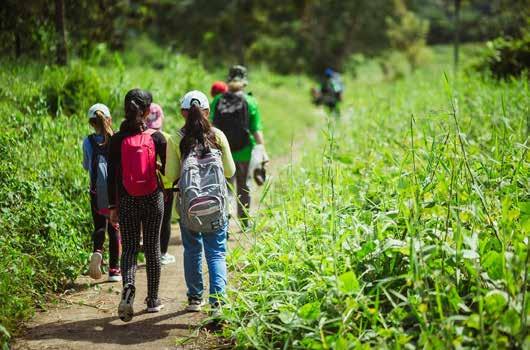
It is well known that spending time outdoors helps us to connect with others, ourselves and the environment. It has also been shown to increase mindfulness, and even scientifically revitalises the body! Studies find that more time outdoors promotes happiness, boosts energy and helps with getting a good night’s sleep; but it also helps us to appreciate the environment and encourages us to care for it!
More often than not, schools are working to integrate the outdoor environment into curriculums around the world. The St. Andrews International Schools Group, Thailand, are on the forefront of outdoor education, with outdoor assemblies and integrated forest school curriculums, as well as some of the most unique outdoor school environments in Thailand. Outdoor learning is embraced and children benefit from regular interactions with nature. So, what’s stopping you from learning outdoors today?
28 ScandAsia • April 2023
www.standrews-schools.com Dusit Sathorn
107
St. Andrews International School
Green Valley Sukhumvit
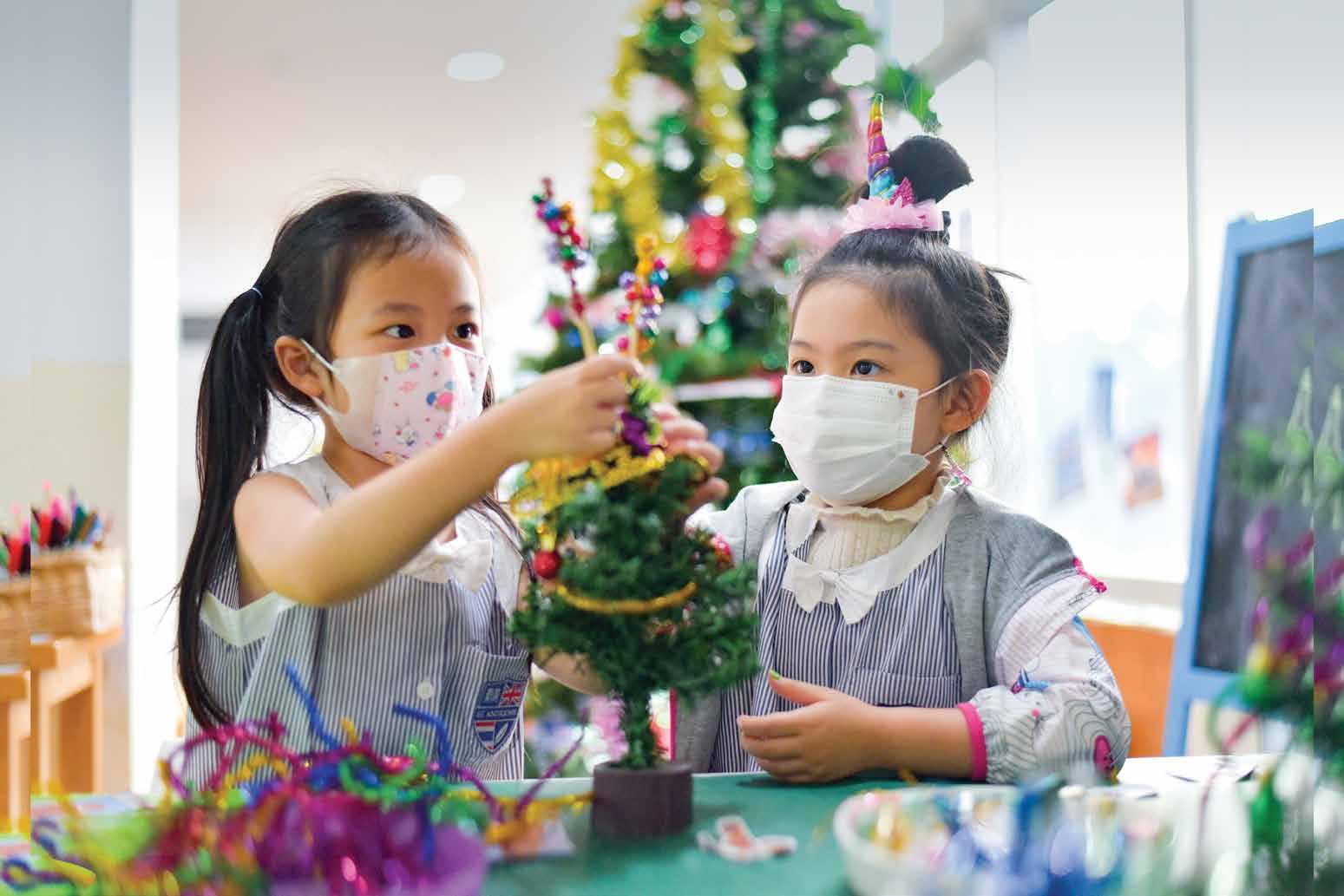

April 2023 • ScandAsia 29
Minecraft for Learning?
Bangkok Patana School recognised as a top user of Minecraft Education Edition
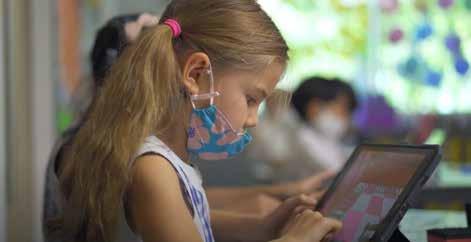
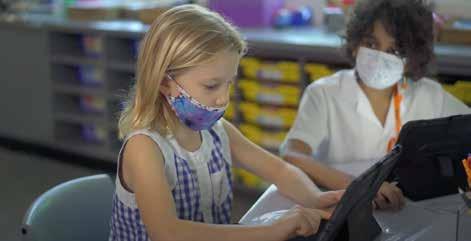
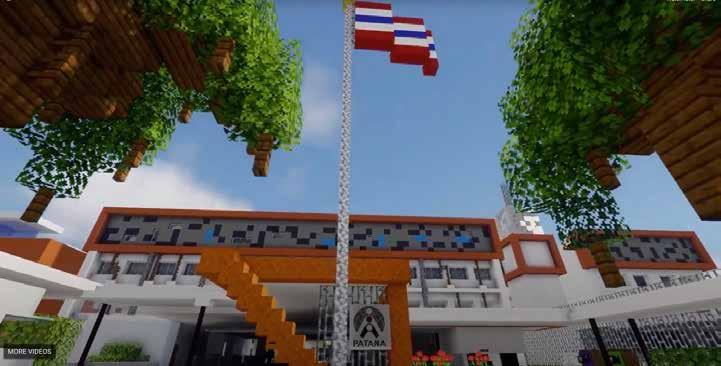
If you have a child five years or older who has access to an electronic device, you will most likely have heard about Minecraft. Launched in 2009, this incredibly popular game is often described as virtual Legos. With few rules and no levels, children can play alone or with friends, they can create an existing fantasy world or build one from scratch or they can fight villains. Some parents of children with autism and ADHD have even credited Minecraft with improving their children’s social skills and there is a Minecraft server specifically for young people with autism and ADHD.
Since children are having such fun with Minecraft, it is inevitable that innovative teachers would take this into the classroom. In fact, tens of thousands of teachers around the world have! Amidst all these schools and classrooms, Bangkok Patana School was recognised by Microsoft as one of the top users of Minecraft Education Edition (EE).
30 ScandAsia • April 2023
“We chose Minecraft because of its popularity and depth of opportunities for cross-curricular learning. Our students are already motivated and able to play in all kinds of Minecraft worlds. We use this enthusiasm to help them explore new concepts and practice areas of learning,” explained Max Hopwood, Primary Leader of Learning for ICT at Bangkok Patana. In the classroom, Primary students are learning literacy, maths and sciences through Minecraft. Teachers have found that it allows students to grasp and understand concepts that are normally beyond the Primary age curriculum.
Learning where innovation is easy
“Minecraft Education Edition allows us to capture the experimental aspects of learning in a virtual environment where mistakes are celebrated and innovation is easy. Students test ideas, create new projects and
problem solve without any fear or errors. Also, while playing collaboratively, students hone their cooperation, teamwork, communication and negotiation skills, which are highly desirable skills in a connected world,” Hopwood elaborated. Collaborative Minecraft worlds encourage students to support one another with positivity and maturity, learning to adopt a ‘coaching’ role than a ‘telling’ one. In Year 5 for instance, the children follow a series of worlds focusing on loops, nested loops, if, ‘if then’ and ‘if not then’ statements to solve problems to make a robot (called an agent), to build and fix obstacles.
Making mistakes and experimenting safely
Teachers say that being able to make mistakes and experiment safely is key for student learning. “With Minecraft, there are so many ideas that can be tried and so many things that can players to dive into,”
said Glenn Malcolm, Primary at Bangkok Patana. He noted that Minecraft enables students to use logical thought as they start to experiment with block-based coding, which then leads them into areas like Java that are already built into the platform. Of course, for the students, Minecraft maintains that ultimate joy of being able to ‘game’ at school.
Bangkok Patana most recently has integrated Esports modules into the optional after-school Minecraft sessions. This provides a good lead in to a large Esports event that the school is hosting in June for students in Thailand-based schools.
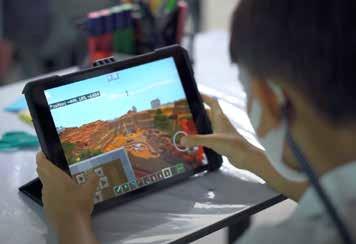
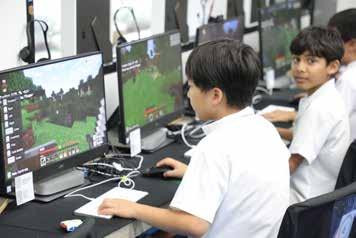
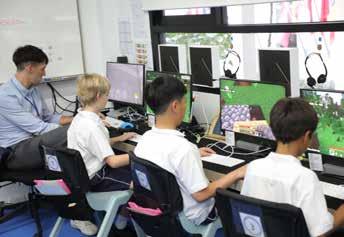
For more information about Bangkok Patana School, please visit our website at www.patana.ac.th
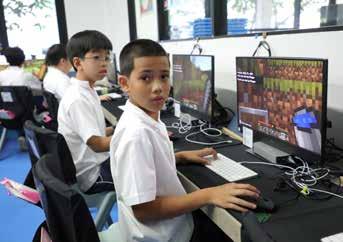
April 2023 • ScandAsia 31
The
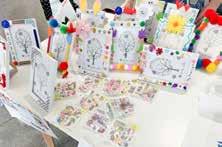
On 6th February 2023, a devastating earthquake struck parts of Türkiye and Syria. At King’s Bangkok this news spread quickly. In Geography lessons, the Year 4 students had been exploring the big idea, “Why is the Earth’s surface constantly moving?”, and had become knowledgeable on the effects of earthquakes on landforms, buildings and people. The recent news about this terrible natural disaster connected immediately with them and they were desperate to do something to help the families affected by the earthquake. They leapt to action promptly! In one class a student persuaded her classmates to write and sell exclusive newspaper articles about the earthquakes to raise funds. Students in other Year 4 classes also wanted to help those in need, so they immediately planned a “Sharing The Love” fundraising event to happen in the same week as Valentine’s Day.
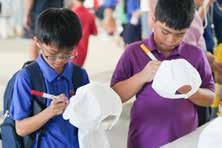
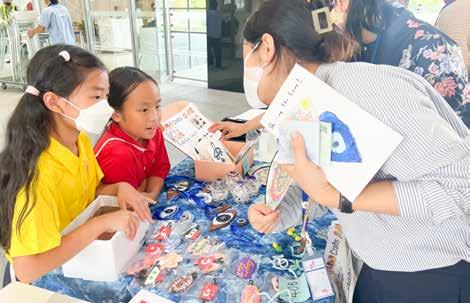
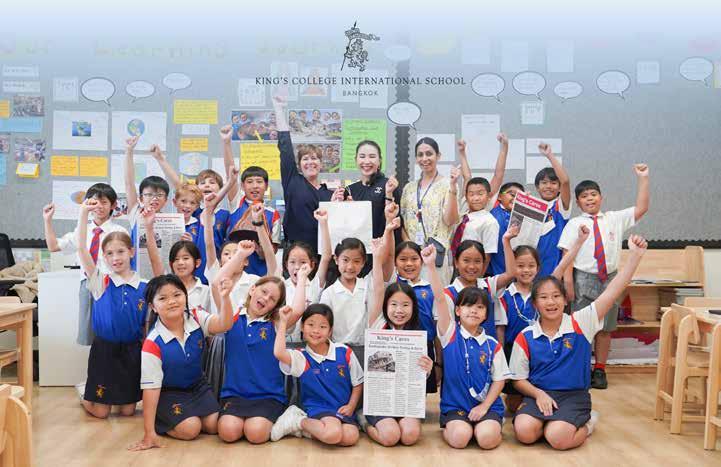
32 ScandAsia • April 2023
“Sharing
Love” fundraising event at King’s Bangkok
The entire Year 4 Community got involved. In their classrooms, the students wrote newspaper articles and made handmade gifts to sell, while their teachers contacted the King’s Bangkok parent community to ask for donations of cakes and other items to help raise money. Many Year 4 parents generously donated prizes and momentum gathered…
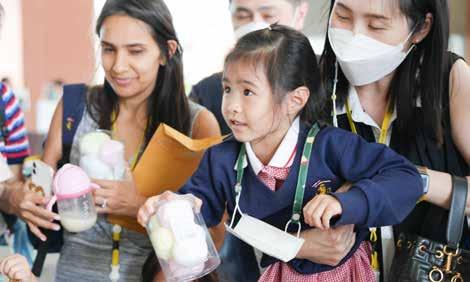
Hearing news of the fundraiser, Mr. Harry Roberts, a DT teacher at King’s Bangkok who is a volunteer at Shelterbox - a charity that provides emergency relief after natural disasters - connected with Year 4 teacher and Enquiry Coordinator, Ms. Jo Cullen. They arranged that all the money raised at the “Sharing The Love” event would be donated to Shelterbox, as the charity had teams already on the ground in Türkiye, who were ready to provide tents, cooking equipment and other emergency supplies to families who had lost everything in the earthquake.
“Sharing The Love” was held at King’s Bangkok on 16th February, featuring exclusive newspaper articles, cakes, handmade gifts, games
and raffle tickets for sale. The Year 4 teachers and students manned the stalls, and the whole school community turned up to support. It proved an amazing success, raising over 141,900 baht for ShelterBox! This money has helped families who lost so much, and the Year 4 students were delighted to receive a letter of thanks from ShelterBox and a video from Türkiye showing the ShelterBox team distributing aid and support.
At King’s Bangkok, the school aim is to Engage, Inspire and Extend students, and such a prompt reaction to the disaster was a meaningful way for Year 4 to share their knowledge, as well as “Share The Love”. Ms Jo Cullen says, “We are so proud of our students for showing kindness by supporting a community in need. This is empathic real-life learning in action and a true reflection of our King’s Bangkok motto, “A Great Heart Takes You Further”.
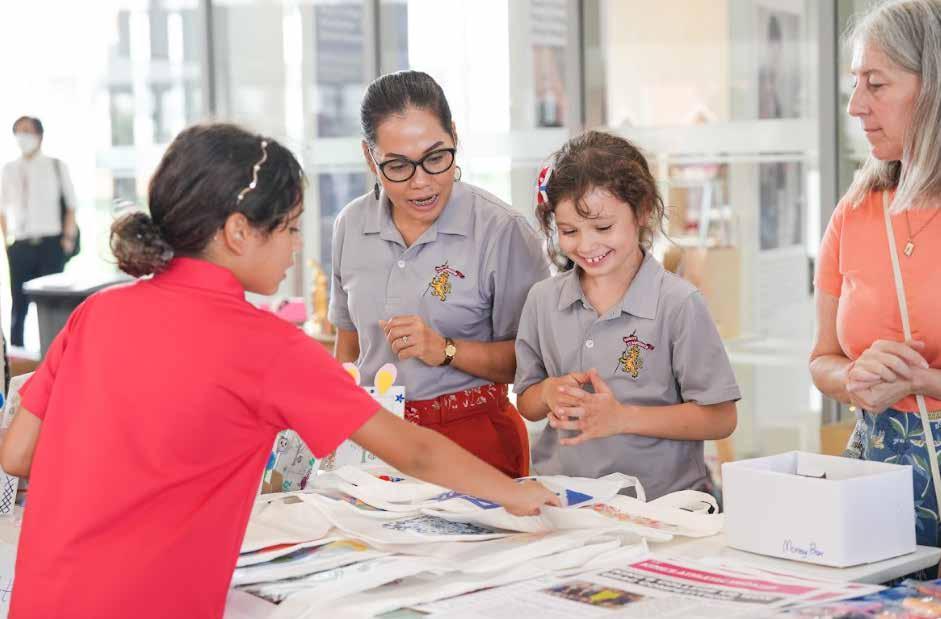
April 2023 • ScandAsia 33
Supporting your child through exam season
Supporting teenagers through their schooling is challenging at the best of times. Add a stressful period of examinations to the mixer and emotions can run high. The term ‘treading on eggshells’ can often be applied in most households. This article explores a few ways in which you can support your children through an exam season. Please kindly note that there isn’t a magic wand with this and there is certainly no magic recipe. These are just some considerations for you and your children to work through. Keep up the passions and hobbies! Some might argue this is a controversial starter. Students probably would say the same too but all research literature concludes that we should continue doing the things we love in times of ‘hardship’ or ‘stress’. Firstly, stress and challenge are absolutely needed and necessary in life, but we need the things we enjoy in our lives to keep us
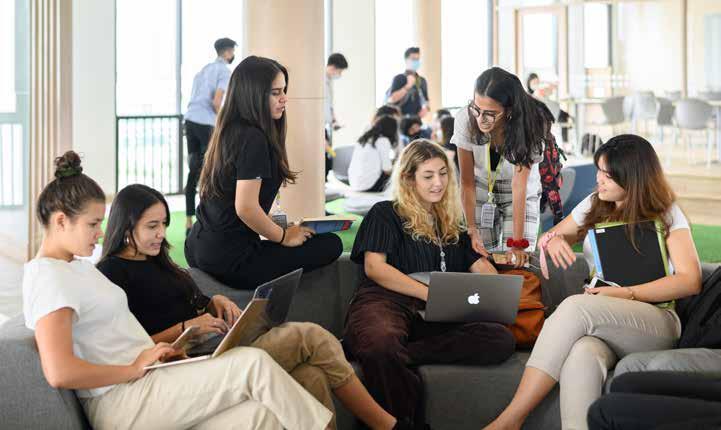
going and remain balanced when things become tougher than the ‘norm’. Research and experience teach us that having balance in our lives, ensures we remain in a stable state of mood, we are refreshed and recharged for the challenges ahead and have the motivation to work in that all important state of flow for longer periods of time to maximise our effectiveness.
Sport and exercise during exams - A study commissioned by the Headmasters’ and Headmistresses’ Conference in the UK, discovered that taking part in competitive sports during GCSE and A-Level exam periods has no negative effects on teenagers’ grades. The study’s organiser, Professor Peter Clough at Huddersfield University’s Psychology department, who analysed the GCSE results of 1,482 students from 19 schools, clarified: “Overall, taking part in sport appears to have a lot of positive impact.” He
claims that, “taking part in sport on a regular basis is not doing [school pupils] any harm and it is doing them good.” According to the Telegraph, Professor Clough’s study has found “a significant relationship between involvement in sport and mental toughness” with the “super performers” – students with top academic results – playing “a lot of sport as well as achieving the highest grades in their class.”
Moreover, according to experts at Birmingham University, sport improves academic performance in a range of indirect ways, too.
1. It produces endorphins and serotonin that reduce stress levels.
2. It boosts general energy levels, which makes it easier to concentrate during revision.
3. It helps regulate sleeping patterns.
4. It improves clarity of thought as training can help the mind meditate on difficult concepts.
34 ScandAsia • April 2023
In short, as long as students maintain good time management practices, their sports activities can actually improve their exam performance.
Reframing the language slightly - How we say and ask things can often be perceived by young people very differently. Especially if they are experiencing some hormonal challenges at that particular time. A simple supportive question such as ‘...are you sticking to your revision schedule?’ can often cause young people to become defensive and a sense of intrusiveness appears out of nowhere. If we change the semantics slightly and put a supportive spin on our so-called ‘intrusiveness’, research will tell us it can go a long way. Asking if you can support with planning the revision schedule or ‘is there anything we can do to best support your revision schedule’ should open more doors for your child to be further willing to share information.
Share the accountability loadAnother way to support your child’s revision schedule and time management is to ask if you could have a copy of the schedule or better still, ask whether it could be displayed in
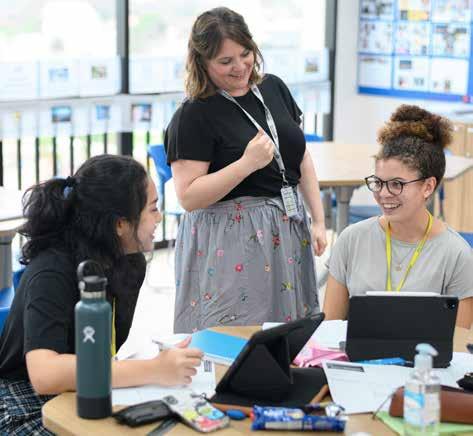
a common area in the house. That way everyone is being accountable for the revision schedule to be followed and adhered to. I must make a point here though and it’s imperative that self-care practices, breaks, exercise and downtime need to be included in the schedule. Why not try to factor in some family time into the schedule as well? Please do remember that it’s your child’s revisions schedule and they should be the designers, implementers and reviewers of its success. You are there as a supportive figure who is on their side.
We pride ourselves at Bangkok Prep for not enforcing a ‘heads down policy’ during exam seasons and important deadline periods as we feel strongly that students need to be keeping up with their ‘nonacademic’ commitments. We also feel that it is teaching them essential life skills, being able to juggle various commitments, even during important exam sessions. Of course, in a school setting there are exceptions to this rule, especially for those students who need extra support in the run up to their exams or who have missed periods of their education.
The overwhelming message (from this article) is that we should be encouraging the students of Bangkok Prep to engage in self-care practices during exams or periods of high workload. This includes sports fixtures, music concerts, family meals, social events with friends and after school commitments. They need these activities to remain recharged, balanced and to perform at their personal best. Using COVID as a lesson and with everything that has happened over the last three years, it has surely made us all realize that looking after both our physical and mental health is priority number one.

Lastly, our students won’t perform to their best of their abilities during testing periods or examinations if they are burnt out. A revision schedule without periods of rest, exercise, healthy dieting and sufficient sleep will cause burn out and in turn result in a drop in performance levels. In a School that prides itself on academic excellence and holistic education, we should never neglect the things we love doing to achieve our goals. In fact, they should be a key component to our success.
Stephen Hurworth is currently Deputy Head Teacher of Secondary at Bangkok International Preparatory and Secondary School. Before Bangkok Prep, he spent seven years at Dulwich College Beijing where for the last four years, he was Assistant Head of the Senior School. Stephen also held leadership responsibilities at DCB as Head of Department, Head of Year and Head of Football. His first international post was at Heathfield International School in Bangkok where he was Head of Key Stage 3, Head of PE and Examinations Officer. Scan the QR code for more information on Bangkok Prep
April 2023 • ScandAsia 35
Inclusiveness - Keeping the Whole Family Together - #uniquelyISB
It takes a lot to make a school great - it comes with hard work and a relentless determination to strive for excellence in academics, activities and a strong sense of community.
All good schools will offer educational and recreational facilities and opportunities for students to excel, discover their interests, and ignite a passion for learning. Truly great schools will do all that and much more - creating those unique extra touches that give students the best possible educational experience as well as lifelong happy memories of their time at school.
Time to explore #uniquely ISB number 7: ISB is Proudly Fully Inclusive
The whole family is included at International School Bangkok (ISB). The Life Centered Education (LCE) program provides state-of-the-art facilities and dedicated specialist teachers and therapists who offer avenues to mainstream education wherever possible.
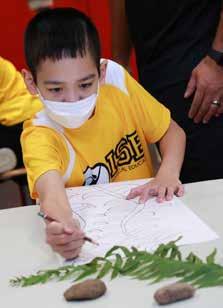
At ISB, we firmly believe that being an inclusive school allows all of our community members to experience a range of diversity that is reflective of the global population. It makes us stronger as a result.
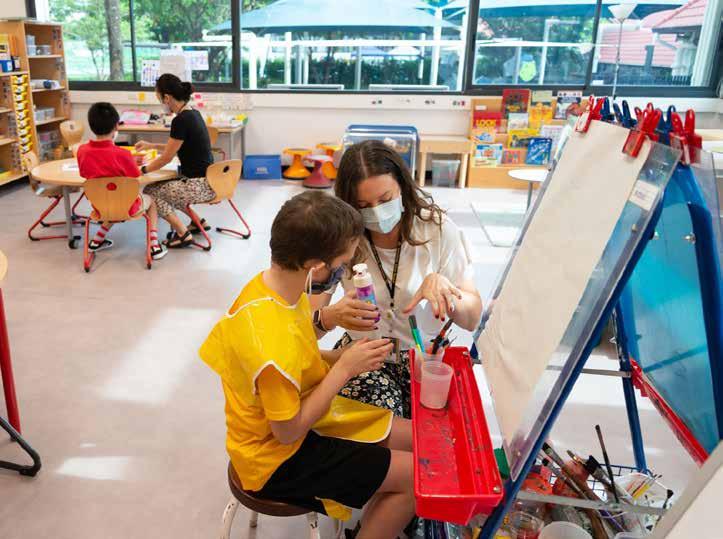
36 ScandAsia • April
2023
Even more importantly, it allows whole families to stay together in one school, with truly personalized education programs available for all students. As an inclusive school, ISB is committed to embracing neurodiversity and successfully serving a number of students representing a full range of learning differences; mild, moderate, intensive, and the exceptionally able.
A Truly Life Centered Education
The Life Centered Education program at ISB is unlike any other program in Bangkok. It offers children who have a diagnosed developmental or intellectual disability (e.g. Global Developmental Delay, Autism Spectrum Disorder, Down Syndrome, etc.) the opportunity to learn with a specialized team of experienced professionals within the vibrant international school setting of ISB. Students receive a highly individualized curriculum focusing on functional academics, socialemotional skills, sensory integration, and life skills. It is a leading model of inclusion, which serves each learner
in the best way possible for their individual needs.
Our approach differs from other programs on offer in Bangkok. LCE goes beyond the typical international school learning support tier system to provide all-encompassing and well-resourced support for students. From our purpose-built classrooms to our specialized staff we offer a truly unique life centered education. Students are placed in homerooms and receive varying levels of services from the LCE program, with the amount of time spent in the homeroom class with peers varying from student to student based on their individual learning profiles. Students have access to highly trained specialist teachers, a speech-language pathologist, Occupational Therapist, and Instructional Assistants.
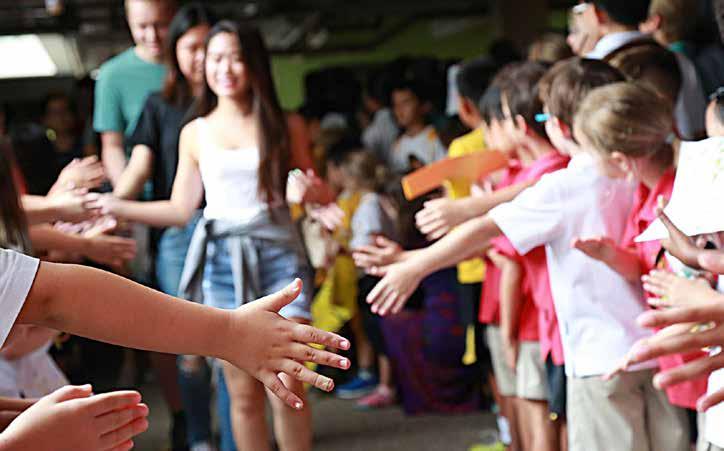
Fully Equipped
Our LCE classrooms are large, flexible, and fully accessible working spaces. We have a fully equipped Occupational Therapy and Sensory space, with a kitchen and private bathroom designed for wheelchair
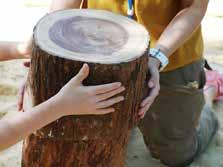
access. Of course, classrooms are fully stocked with materials for a range of functional activities, life skills, sensory imagination, and independent and small group work. Each student’s Individualized Education Plans are carefully crafted around their individual needs to ensure the best mix of individualized instruction in functional academics, social-emotional skills, language development, occupational therapy, life skills, and integration into learning opportunities with typically developing peers.
ISB welcomes applicants for 2023 and beyond. Please visit our website www.isb.ac.th or you can send an inquiry directly to our admissions team.
April 2023 • ScandAsia 37
From Phuket to Denmark and Back Again - A BISP student’s journey of learning, wellbeing and passion
dent. It wasn’t an easy adjustment, but for Daniel, it was the best choice he could have made. As a boarding student, Daniel has thrived and has enjoyed being able to conveniently juggle his studies, training, and social life while on campus. “My boarding experience at BISP has given me more freedom while still allowing me to conveniently make it to my daily football training,” he says.
When current Year 13 student Daniel Christensen first enrolled at the British International School, Phuket (BISP) in Year 4, neither he nor his family had any idea how much the school would shape his life. Half Danish and half Filipino, Daniel and his family were drawn to the school’s academics and sports programmes and the international community.
In 2018, Daniel’s family moved

to Denmark and he was excited to start a new chapter in his life. However, once there, he realised that something was missing. “I missed the frequency and intensity of the BISP football programme. Although I continued to play football in Denmark, I was insistent on training with Coach Jonathas and the Cruzeiro Academy.” Daniel recalls.
Determined to return to BISP, Daniel convinced his parents to let him come back as a boarding stu -
For many international families, BISP is an ideal choice for students who want to excel academically and pursue their passions. With its experienced faculty and academy coaches, top-notch facilities, and commitment to developing wellrounded individuals, BISP provides students like Daniel with a unique platform to reach their full potential and be the leaders for tomorrow.


“BISP has been the ideal place for me to pursue my passion for football,” he says. With aspirations of going on to play professional football upon graduating from BISP, a promising future awaits Daniel.

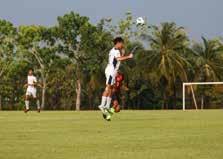

38 ScandAsia • April 2023
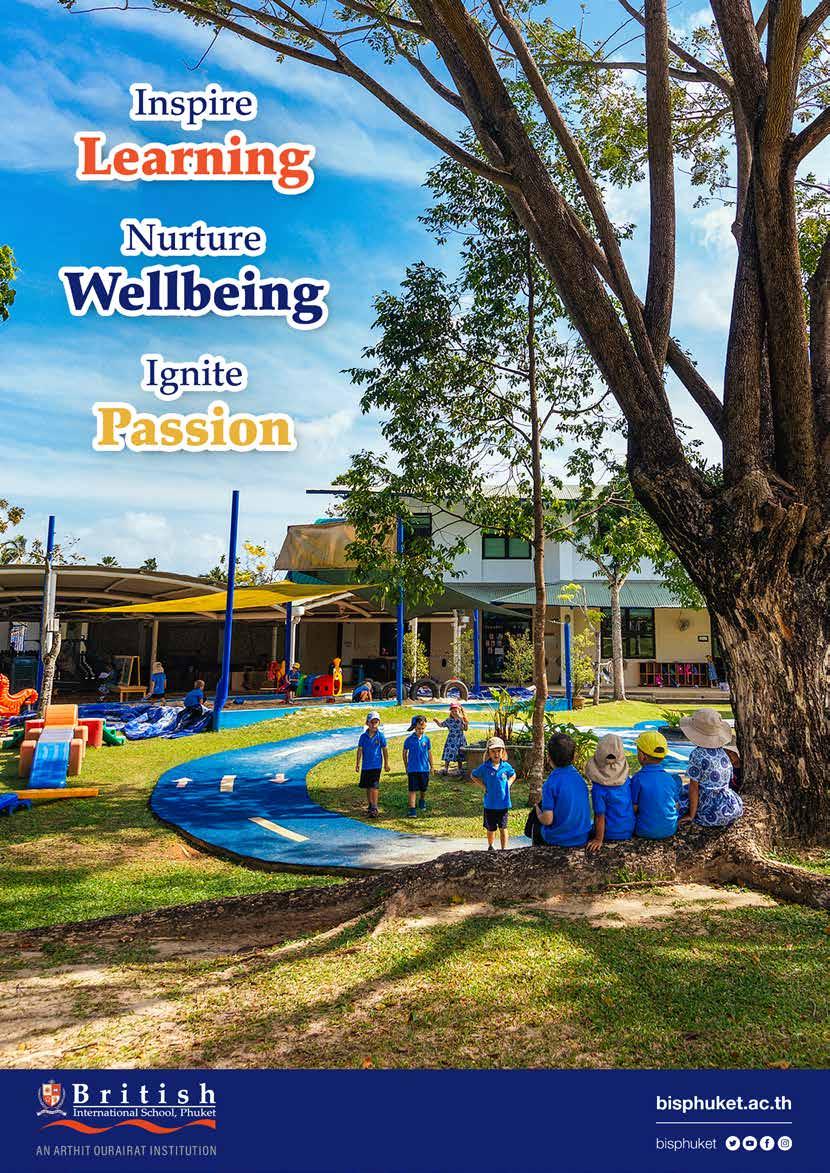
Wearing of School Uniforms
Most parents and educators support mandatory school uniforms. Students’ legal right to free expression remains intact even with mandatory school uniforms.
Students dressed in uniform are better perceived by teachers and peers.
Students can express their individuality in school uniforms by introducing variations and adding accessories.
CON
School uniforms restrict students’ freedom of expression.
School uniforms promote conformity over individuality.
School uniforms do not stop bullying and may increase violent attacks.
In Thailand, all public schools and by far the most private schools require some form of standardized clothing. In the Nordic countries, school uniforms are mostly not required and most parents have an attitude against uniforms.
However, in the US, the use of school uniforms increased from 12% during the 1999-2000 school year to 21% during the 2015-2016 school year, according to figures released in 2018 by the National Center for Education Statistics. The study also found that mandatory uniforms were more prevalent in schools serving lower income families than schools for middle to higher income families.
In the website www.britannica. com, an article lists the most frequently mentioned Pro and Con for school uniforms.
PRO
School uniforms may deter crime and increase student safety outside of school.
School uniforms keep students focused on their education, not their clothes.
School uniforms create a level playing field among students, reducing peer pressure and bullying. Wearing uniforms enhances school pride, unity, and community spirit.
School uniforms may improve attendance and discipline.
Uniform policies save valuable class time because they are easier to enforce than a standard dress code.
School uniforms prevent the display of gang colors and insignia.
School uniforms make getting ready for school easier, which can improve punctuality.
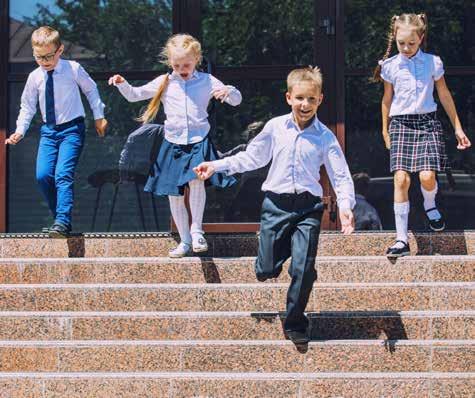
School uniforms can save parents money.
School uniforms do not improve attendance, academic preparedness, or exam results.
School uniforms emphasize the socio-economic divisions they are supposed to eliminate.
Students oppose school uniforms.
Uniforms may have a detrimental effect on students’ self-image. Focusing on uniforms takes attention away from finding genuine solutions to problems in education.
The push for school uniforms is driven by commercial interests rather than educational ones.
Parents should be free to choose their children’s clothes without government interference.
School uniforms in public schools undermine the promise of a free education by imposing an extra expense on families.
School uniforms may delay the transition into adulthood.
40 ScandAsia • April 2023
Personalized and authentic learning at KIS
KIS International School is committed to our vision of inspiring individuals through quality education that is personalized and authentic. We believe that students should be equipped with the tools to become lifelong learners, successful leaders, and responsible global citizens.
KIS welcomes nearly 800 students from 50 nationalities, and all are valued and respected. The school aims to develop critical thinking and problem-solving skills in students, alongside knowledge acquisition.
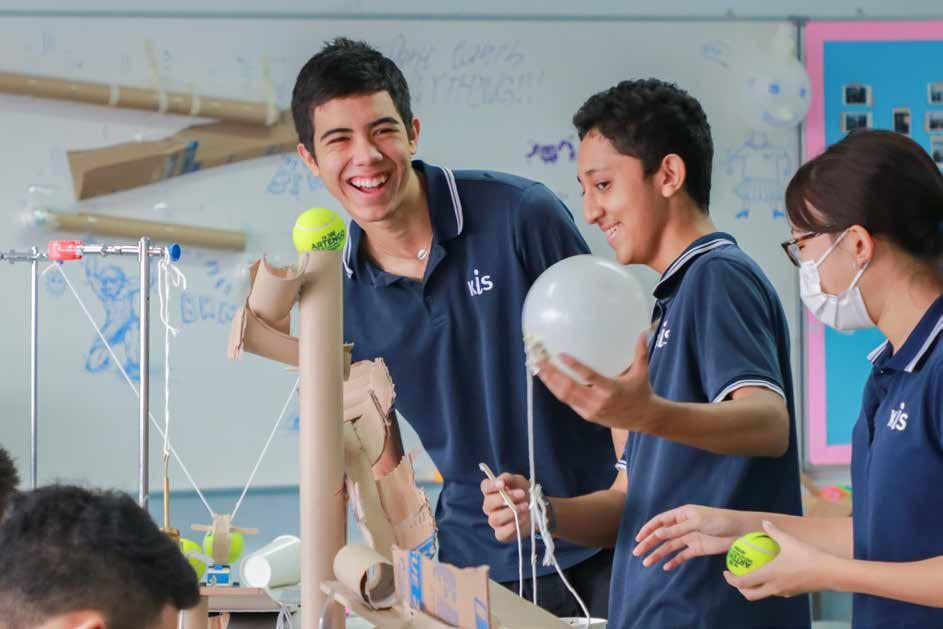
KIS is the only school in Bangkok to offer all four International Baccalaureate® programs, and from August 2022, have added the International Baccalaureate® Career-related Programme (IBCP). The IBCP is a dual-enrollment program for Grades 11-12 students with a strong interest in sustainable leadership, sustainable business, art, or design. It combines the theoretical principles and academic rigor of the Diploma Programme with tailored career-related studies and practical work experience. Students are given the flexibility to choose subjects that match their academic strengths and interests.

KIS students consistently achieve high academic success, with IB scores above the global average. Over a third of graduating students scored 40 or above, which can be attributed to the challenging, well-balanced, and differentiated learning experience that the school provides.

KIS is a welcoming community, and learners benefit from a low student-to-teacher ratio of 1:8, ensuring that they are guided by dynamic, highly-qualified IB trained educators from around the world.
The school is situated in a lush

campus in a gated housing estate near the city center, providing a spacious learning environment that is away from noise and pollution while remaining easily accessible from both central Bangkok and suburbs.
The campus boasts wellequipped science labs, state-of-theart-design workshops, art and drama studios, libraries, an auditorium, grass sports fields, indoor airconditioned courts, and three swimming pools.
KIS has a vibrant community atmosphere, and students and parents quickly feel at home and develop a sense of pride in the school.
KIS provides all students, from the youngest children to graduates heading off to the best universities, with the tools they need to be inspiring individuals. The school invites parents to see why their community stands apart and why KIS should be their top choice for quality education.

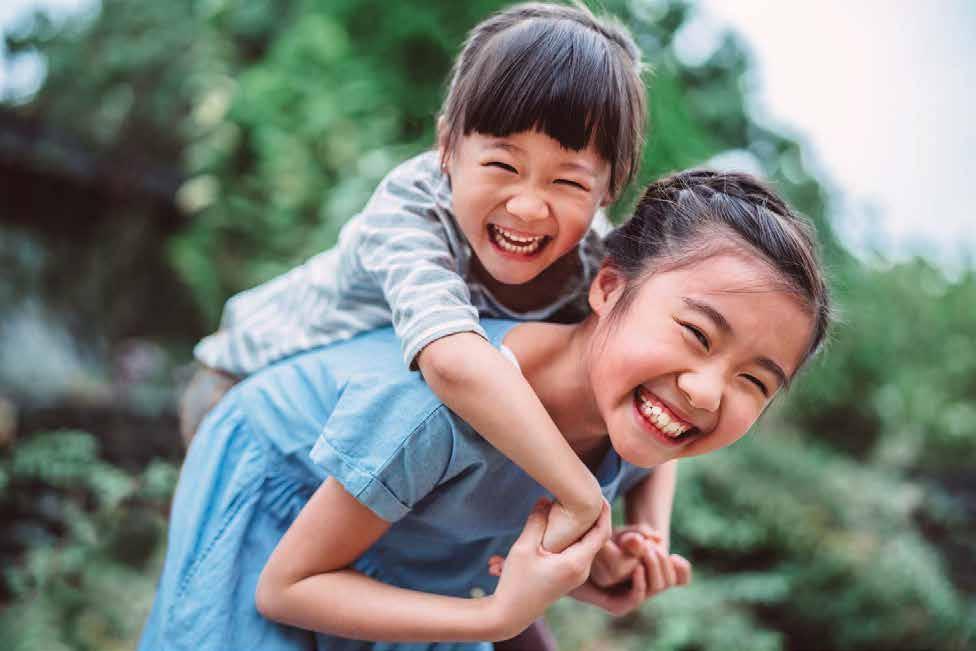
April 2023 • ScandAsia 41
How the A-level compares to IB Diploma
IGCSE still uses the A* to G grading system, rather than the new GCSE numerical grading.
A-Levels
A-level stands for Advanced Level. Originating in the UK, it is an academic qualification earned upon successful completion of an exam after GCSE or IGCSE, A-levels are subject-specific and taken around age 18 (at the end of year 13). A-levels give students an opportunity to undertake specialised study in a few subjects, and their successful completion is an entry requirement for many universities.
Tanglin Trust School, a leading international school in Singapore, offers students the flexibility of choosing an A-level or International Baccalaureate (IB) Sixth Form pathway.
The IB Diploma Programme
Understanding the choices available to students nearing the end of their school education is not easy at all. Here is a brief overview of what the GCSE is and what the international alternative IGCSE is. Later, students nearing the end of secondary school can choose between pursuing A-levels or the IB Diploma.

The GCSE
GCSE is a United Kingdom academic qualification earned by a student, typically by the age of 16, marking the completion of mandatory schooling in the UK. After a student is awarded their GCSE, based on exam results, they may continue their schooling (Sixth Form) until university or college, or they may opt for vocational and apprenticeship educational training until at least 18 years of age.
The IGCSE
The International GCSE (IGCSE) is, you guessed it, the international variant of the GCSE. The IGCSE has developed into its own entity, and IGCSE is offered in many countries, including some international schools in the UK. Subject selection is similar to the GCSE, but the IGCSE includes additional foreign languages, and offers more subjects. Core subjects are English, Maths, and Sciences, and students must take 5 to 14 subjects. Many offer core and extended curricula, meaning the IGCSE is able to meet the needs of students with different learning abilities.
The alternative to A-level is the International Baccalaureate Diploma Programme (IB DP). The IB Diploma Programme (IB DP) is for students aged 16 to 19. Courses are offered at both a standard level and a higher level, with the higher level being more advanced (240 teaching hours compared to the standard level’s 150). Students must take 3–4 subjects at the higher level, and the rest at the standard level.
The grading structure of the IB Diploma differs from the GCSE, IGCSE, and A-levels in that it assigns an overall grade based on all areas of study, rather than a qualification for each subject. IB Diplomas are awarded to students who earn an overall grade of at least 24 points.
How the IB Diploma compares to A-levels
Compared to A-levels, the IB Diploma is less specialised. Students usually write three to four A-levels, while students in the IB Diploma complete six courses from at least five subjects, plus the DP core. Less specialisation can translate into a higher workload, and some students find the programme very demanding.
While A-levels offer specialisation, some consider the broader scope of the IB Diploma to be superior preparation for university. After all, many students are not prepared to decide which subjects they want to focus on in university, so getting a more well-rounded education can be beneficial.
42 ScandAsia • April 2023
Established in 1925, Tanglin Trust School is the oldest British international school in South East Asia.
What motivated us then, motivates us now –to be the best school in the world.
Through our innovative approach to learning and dynamic teaching staff, Tanglin nurtures and inspires lifelong learners. Our students talk with passion about their school because they feel happy and valued. Tanglin is an environment where the desire to achieve grows.
As the only school in Singapore to offer A Levels and the IB Diploma in Sixth Form, students study a programme that suits them, ensuring they thrive and flourish. Our students consistently achieve exceptional results and go on to the world’s leading universities.
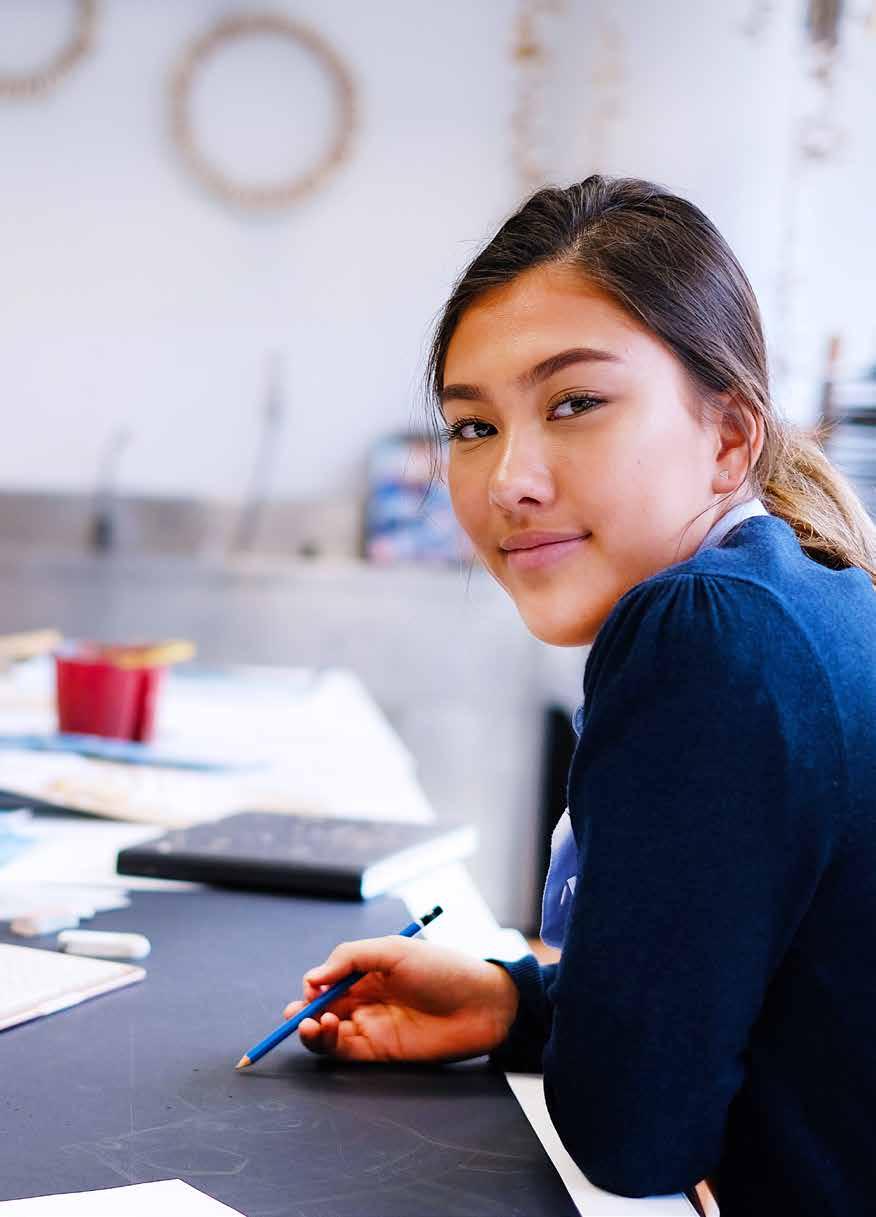
The community ethos we have built over the years enables every individual to fulfil their potential. At Tanglin we respect one another, celebrate successes at all levels and support each other to be the best we can be.
Find out more at www.tts.edu.sg and discover why Tanglin was named International School of the Year 2023.

CPE Reg. No. 196100114C (7/6/2017 - 6/6/2023)
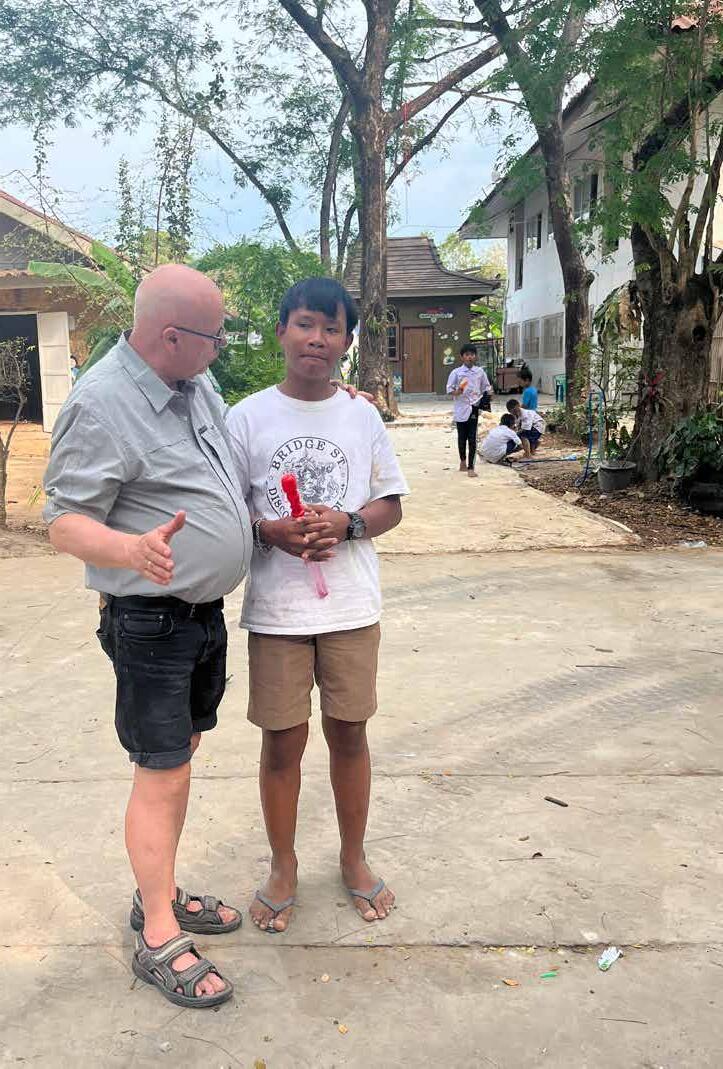
44 ScandAsia • April 2023
Whatever money we have, will go to support those with the biggest potential.
Dane supports abandoned children in Khon Kaen
Baan Luuk Rak is not just a regular orphanage. Although many of the kids are left without parents or has parents they rarely see, adoption is never on the table.
By Miabell Mallikka Smedegaard
Six years has it been, since Danish Steen Pausbæk and his family first got involved with Baan Luuk Rak Children Home in Khon Kaen.
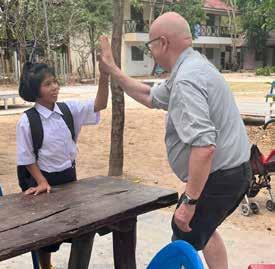
The home for abandoned children was founded in 1997 by Suriya Somjai and his wife, who died of breast cancer eight years ago.
Her sudden death left her husband and their now 24-year-old daughter alone to provide for the 46 children that resides at the orphanage. The youngest being only seven months, while the oldest is 18 years old.
Besides providing financial aid, Steen collects money for the children’s home from friends and Danish businesses back in Denmark. An effort that recently resulted in a donation of 20,000 DKK from Honorarfonden by Novo Nordisk.
But the family’s involvement goes beyond financial support. This is clear, as Steen steps out of the car and in to the small parking lot in front of the main building. Here, a small boy by the age of seven, immediately runs to greet him.
Though they don’t speak the same language, the little boy throws himself into Steen’s arms, with a beaming smile that lights up his face.
“I’m sure he won’t be the only one,” Steen says with watery eyes that shows, he is clearly touched by the situation.

“I miss you mom”
With the little boy dragging along, clinging to him like glue, Steen goes to greet another little girl, he has become quite familiar with through the time the family has spend there.
“Hello Mint. It’s good to see you,” he says to the girl, who looks down the long wooden table in front of her with a shy, subtle smile.
“Jum, can you translate that?” he asks his wife, who translate for the little girl with the black backpack tucked over her shoulders, which indicates that she has just come back from school.
“When we were here back in October last year, it was her birthday,” Steen shares.
“Back then she asked, if she could call her mom, because she really missed her. She hadn’t seen her for years. They lent her a phone and she then tried calling her mom, but there was no answer. She then sent her a text message saying, that she missed her. Two days later her mom replied, that she had remarried and that Mint now has two younger siblings, but that there is no room for her in the family,” Steen shares with a voice that is tearing up.
April 2023 • ScandAsia 45
Even though he cannot communicate directly with the kids, he knows all of their stories and he manages to create bonds beyond words.
He raises his hand, encouraging the girl to give him a high-five. She smiles and sends him a high-five back.
Not up for adoption
Baan Luuk Rak is not just a regular orphanage. Although many of the kids are left without parents or has parents they rarely see, adoption is never on the table.
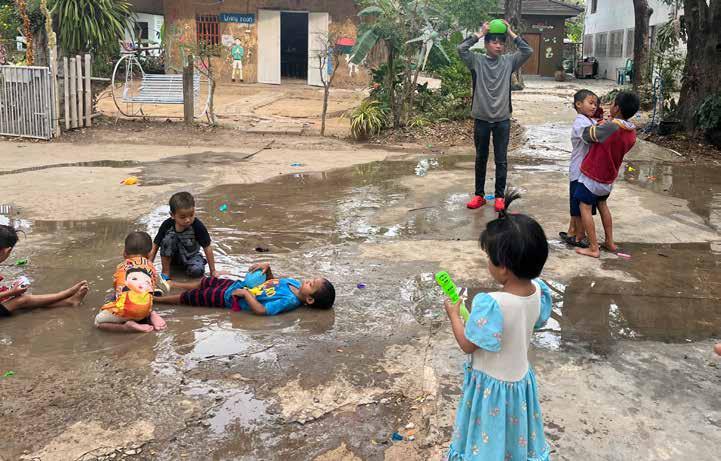
To protect the kids from the risk of being hurt and abandoned all over again, Baan Luuk Rak instead provides them with a home as well as tutoring and the possibility of gaining work experience at the premises. To do this, they have created different project like gardening, a clothes altering business and a café, which is run by the kids themselves. All the profit goes to the children’s home and to support the kids.
One of these kids are View. Six years back, he and two of his younger siblings were left at the orphanage by their alcoholic mother.Their aunt chose to adopt a fourth sibling, but she had no room for the other three children.
View was then nine years old. With a mother who was unable to take care of her four kids, and an aunt who only had room for one, the remaining three siblings have been taken care of each other at Baan Luuk Rak ever since.
“View dreams of becoming an engineer,” Steen tells with proud in his voice. He has known the boy for six years now, and it is obvious, that the two have created a special bond despite the linguistic barrier.
46 ScandAsia • April 2023
One of the things that touches me the most, is the childrens trust in people. Their trust in me.
But an education like that doesn’t come cheap, and the orphanage is not necessarily capable of the financial burden of bringing the many kids though the educational system.
“Whatever money we have, will go to support those with the biggest potential,” replies Suriya Somjai, when asked about Views possibilities.
Touched by the trust
As Steen walks into the café, one of the older girls behind the counter greets him with a hug.
“She has never done that before,” says Steen with disbelief, like he cannot believe, what just happened.
“Jum. Did you see that? Did you see how she greeted me with a hug? She has never done that before,” he tells his wife with a lot of enthusiasm.
He sits down in the corner of the small café with a mineral water and a joyful grin.
“One of the things that touches me the most, is the childrens trust in people. Their trust in me. How they always remember us from the last time we were here and always seem happy to see us again. That really warms my heart. Knowing that coming here seems to make a difference to them.”
Another young girl, carefully pokes her head into the café and tries to gets Steen’s attention. Short after she slowly enters and walks towards the corner, where Steen is seated. It doesn’t take long before Steen ask the young people behind the counter, if it is okay that he buys her a little treat. Soon after he ask her to pick out a chocolate bar from a basket on the counter.
“I usually trying not to make it seem like I’m favorizing, but look how happy she is now,” he says with a smile, just as big as the girl’s.
The difference a balloon makes
As the family leaves the café, they go to fetch the bags of toys that they brought for the kids.
“Last time, a boy asked me to crawl up a pole to get him a balloon,” Steen’s wife Jum tells with a warm laugh.
“He said that since I am bigger than him it would be easier for me,” Jum adds.
Because of that incidence, the family deliberately brought the kids balloons, along with different kinds of more regular toys.
As soon as the bags were out, the kids swarmed around them, buzzing like excited little bees.
The toys were laid out at the long wooden table in the center square. The kids jumped towards it, but without hoarding. Every kid received a piece of toy and a balloon.
Suddenly, a child turned on the water hose, and started a balloon-water fight. Kids were jumping around the puddle of water that quickly formed. Filling their balloons with water and throwing them around. Smiling. Laughing. Enjoying themselves, while Steen, his family and Suriya Somjai observed them from the sideline. All with a blissful smile on their face.
Baan Luuk Rak Childrens Home: https://www.facebook.com/BaanLuukRakChildrensHome
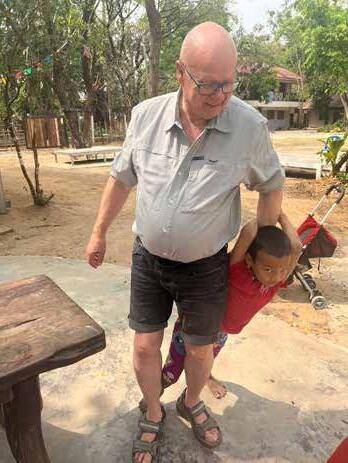
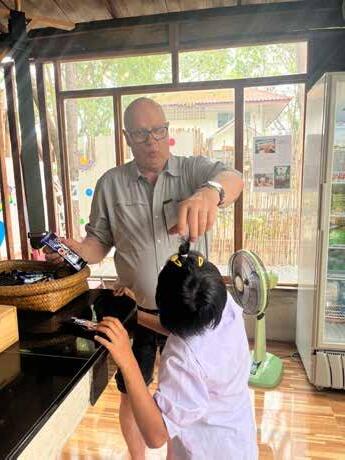
April 2023 • ScandAsia 47
Globally memorable: Tham Luang Cave in Thailand
Five years ago, all eyes were on the incident of twelve teen football players and their coach from the “Wild Boars” team, who got trapped inside Tham Luang cave by monsoon rains.
Text and Photos by Kanlayakorn Pengrattana
One of the most memorable news world wide in 2018 was undoubtedly, the rescue operation of thirteen boys from a cave “Tham Luang Khun Nam Nangnon” in the northern part of Thailand.
The search and rescue operation required global collaborations from many countries including Australia, Belgium, Canada, China, Czech Republic, Denmark, Finland, France, Ireland, India, Israel, Laos, Japan, Myanmar, Russia, the Netherlands, Ukraine, the United Kingdom, and the United States as both Thai Navy Seals and international cave diving experts led the mission.
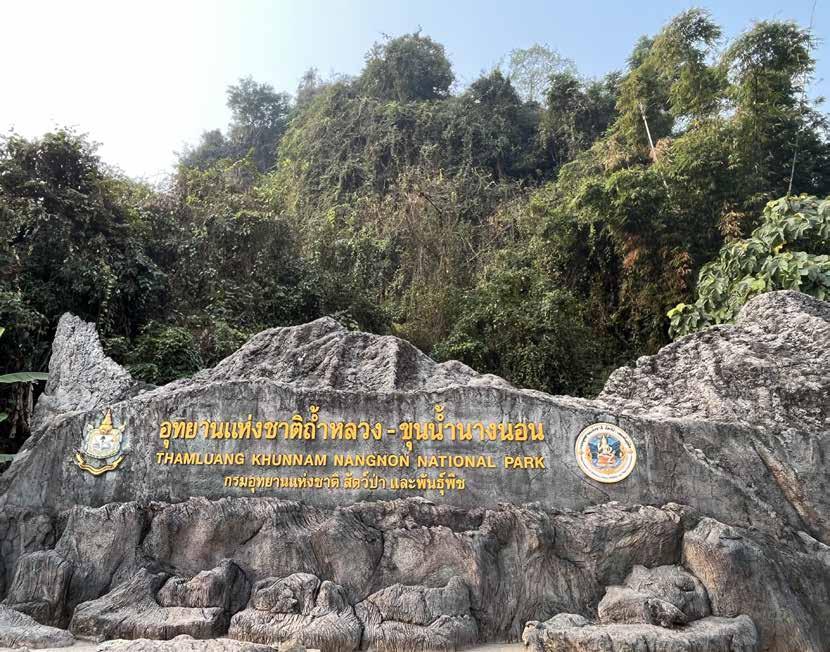
48 ScandAsia • April 2023
The operation began on 23 June 2018 and it took a total of seventeen days before the boys and their coach on 10 July 2018 were all successfully retrieved alive from the cave. However, one life was lost at the time as the former Naval Lieutenant Saman Kunan or “Sergeant Sam” from the rescue team died while transferring air bottles to various points in the cave.

The whole operation has been considered one of the most complex rescue operations in history due to the special conditions of the cave itself and the rainstorm. But prior to the Thirteen Lives incident, only a few people would have heard about Tham Luang Khun Nam Nangnon cave.
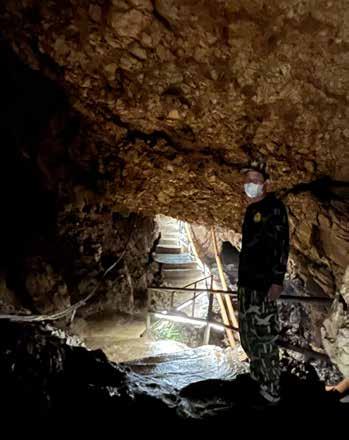
Mr. Sutud who has been working as one of the cave’s directors for over thirty years shared that several years back, Tham Luang was rarely visited, mostly by European and American tourists.
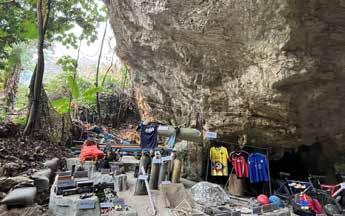
Tham Luang Khun Nam Nangnon National Park is a large limestone cave located in Mae Sai district, Chiang

April 2023 • ScandAsia 49
At the cave’s entrance, there is an exhibition about the rescue mission consisting of actual tools used in the operation and belongings of the twelve teen football players and their coach, a diagram of the cave, and a summary of the incident.
Two Danish divers, Ivan Karadzic and Claus Rasmussen, and the Finnish diver, Mikko Paasi, also participated in the rescue effort.
Rai province, Thailand, close to the Thailand-Myanmar border. It has been ranked the fourth longest cave in the country with 3,846 meters long, according to the surveyed distance data from 2019.

Inside, the cave is a pathway of stalactites, stalagmites, and streams. In the past, the tourists would be given a gas lamp to use for exploring the natural architecture of the place. The lamp would last about an hour before it extinguished.
If they wouldn’t come out of the cave by then, the directors would be sent to bring them back, added Mr. Sutud.
Normally, the authorities allow people to access Tham Luang Cave during the dry season (DecemberJune) only. The cave is closed in the rainy season (JulyNovember). After the success of the thirteen lives rescue mission in 2018, it has dramatically changed the cave into one of the most attractive locations for both Thai and international visitors.
The whole world applauded when the entire Tham Luang rescue was successfully accomplished.The situation not only drew global attention to the actual location in Chiang Rai, but it also inspired entertainment production to produce various films and documentaries about the incident such as “The Cave,” “Thirteen Lives,” and “Thai Cave Rescue” and the story was written into books as well.
Today, Tham Luang has been developed by the au-
50 ScandAsia • April 2023
The whole world applauded when the entire Tham Luang rescue was successfully accomplished.
thorities to make it more proper for tourists’ visit. Starting by the tram services that are available to shuttle tourists free of charge to the front of the cave.
At the cave’s entrance, there is an exhibition about the rescue mission consisting of actual tools used in the operation and belongings of the twelve teen football players and their coach, a diagram of the cave, and a summary of the incident.
They already installed the light in the cave, improved the walkway, and only allow visitors to go into the cave as far as 200 meters away from the entrance with the cave’s directors guiding for the safety of the tourists.

Also, there is a monument of Sergeant Sam built to honor his contribution, a museum cave which presents the rescue operation in detail, and a souvenir shop.
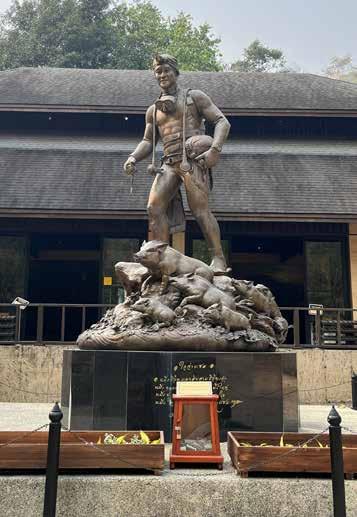
Any tourists coming to Tham Luang Khun Nam Nangnon National Park with no intention of using personal vehicle, you can fly from your destination to Mae Fah Luang – Chiang Rai International Airport, take a public bus to Chiang Rai Bus Terminal or Mae Sai Bus terminal before taking a public bus or public motorbike to the cave.
The distance between Mae Sai Bus terminal to the cave is about 4.4 kilometers and takes less than 10 minutes. Besides, there are several accommodations in Mae Sai district that feature the beautiful view of the Nangnon mountain, which would bring you closer to natural scenery worth seeing with your own eyes.
April 2023 • ScandAsia 51
